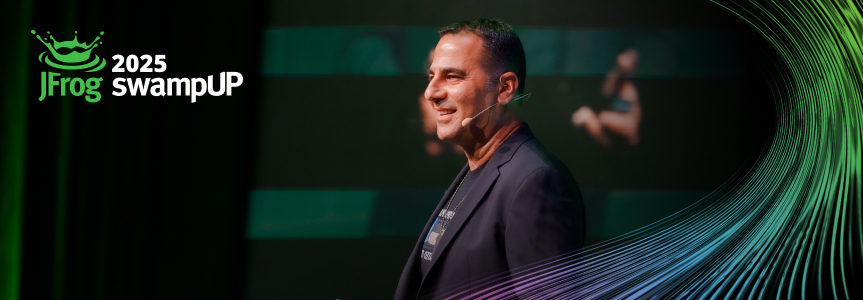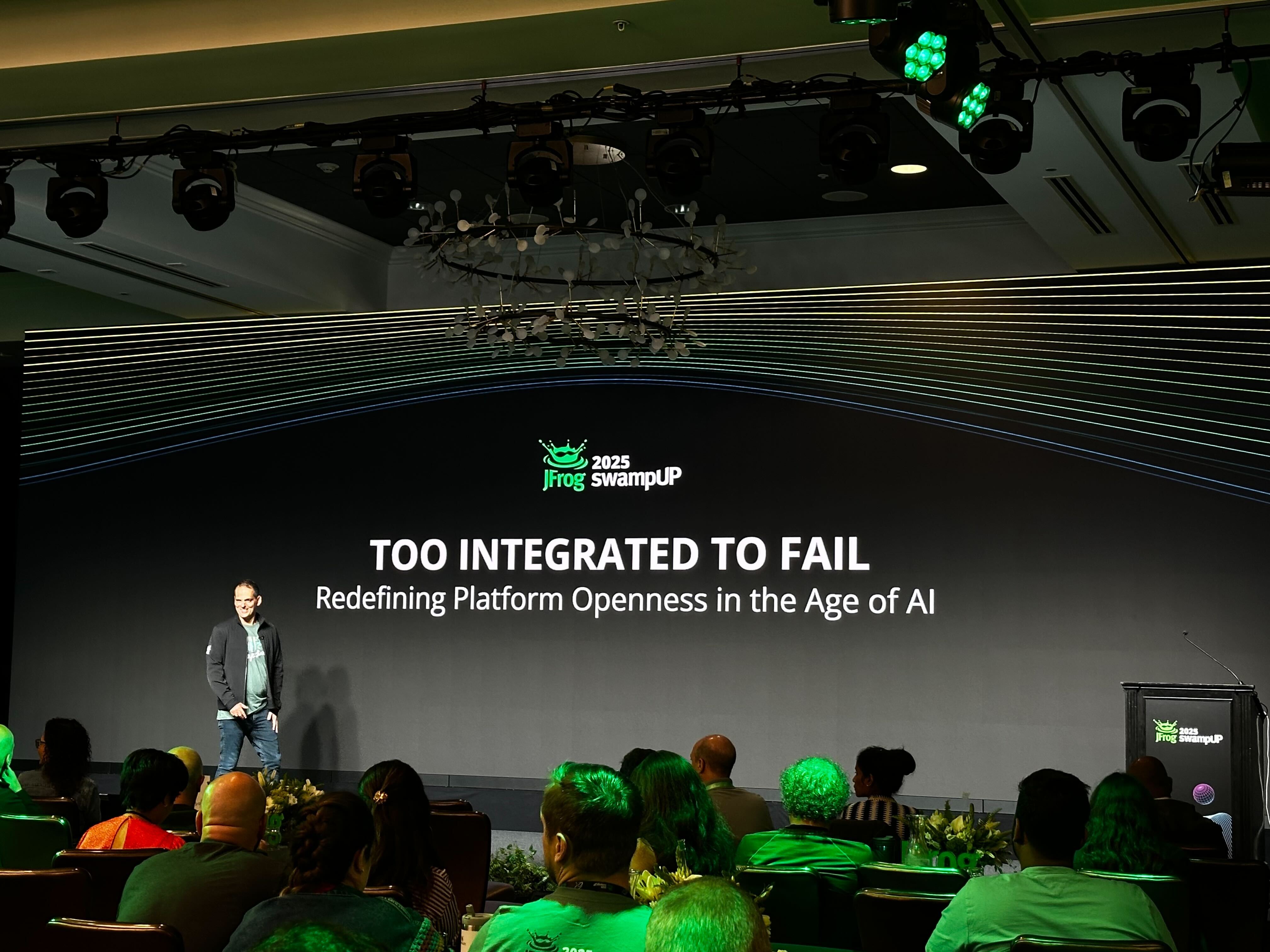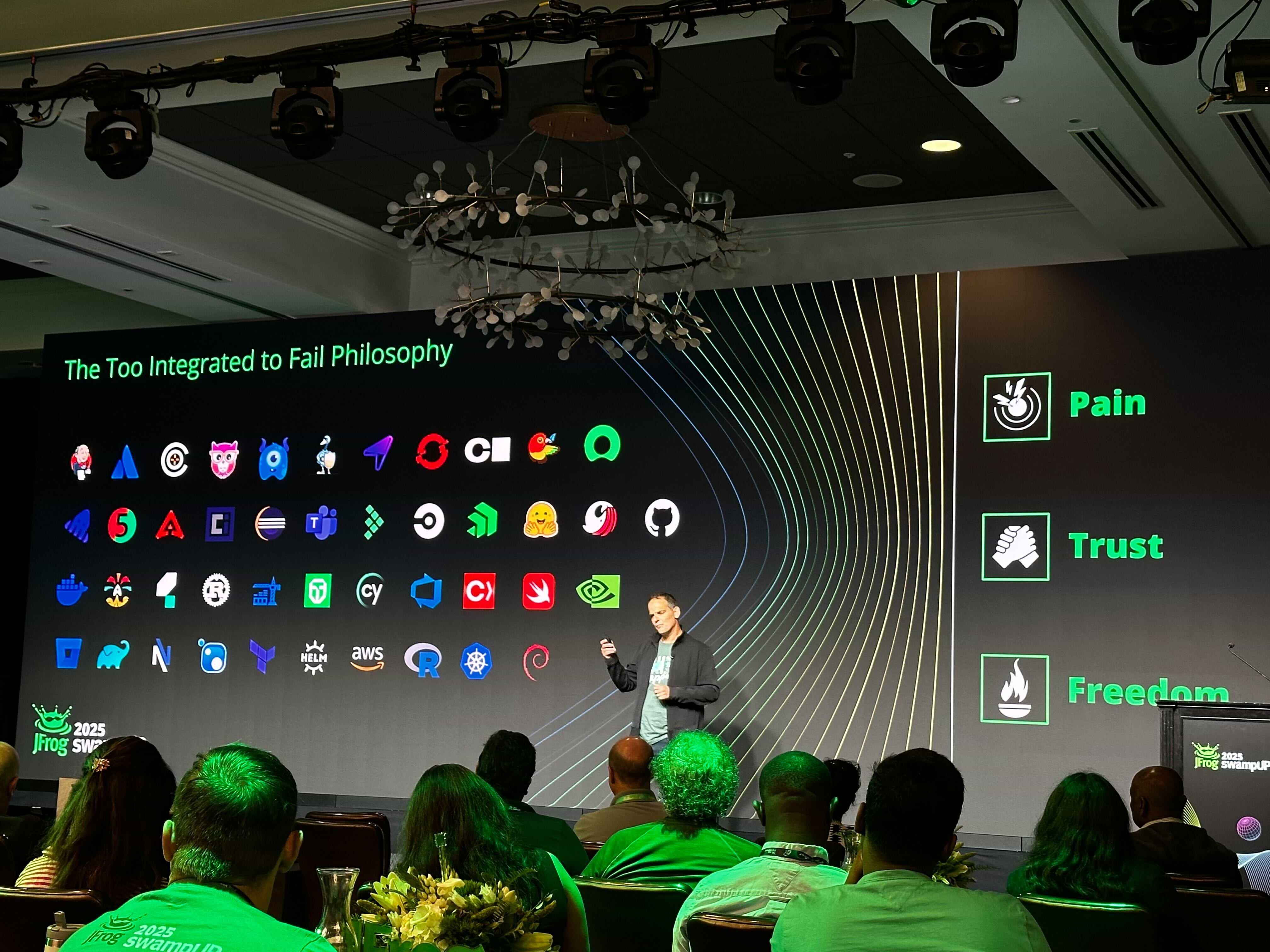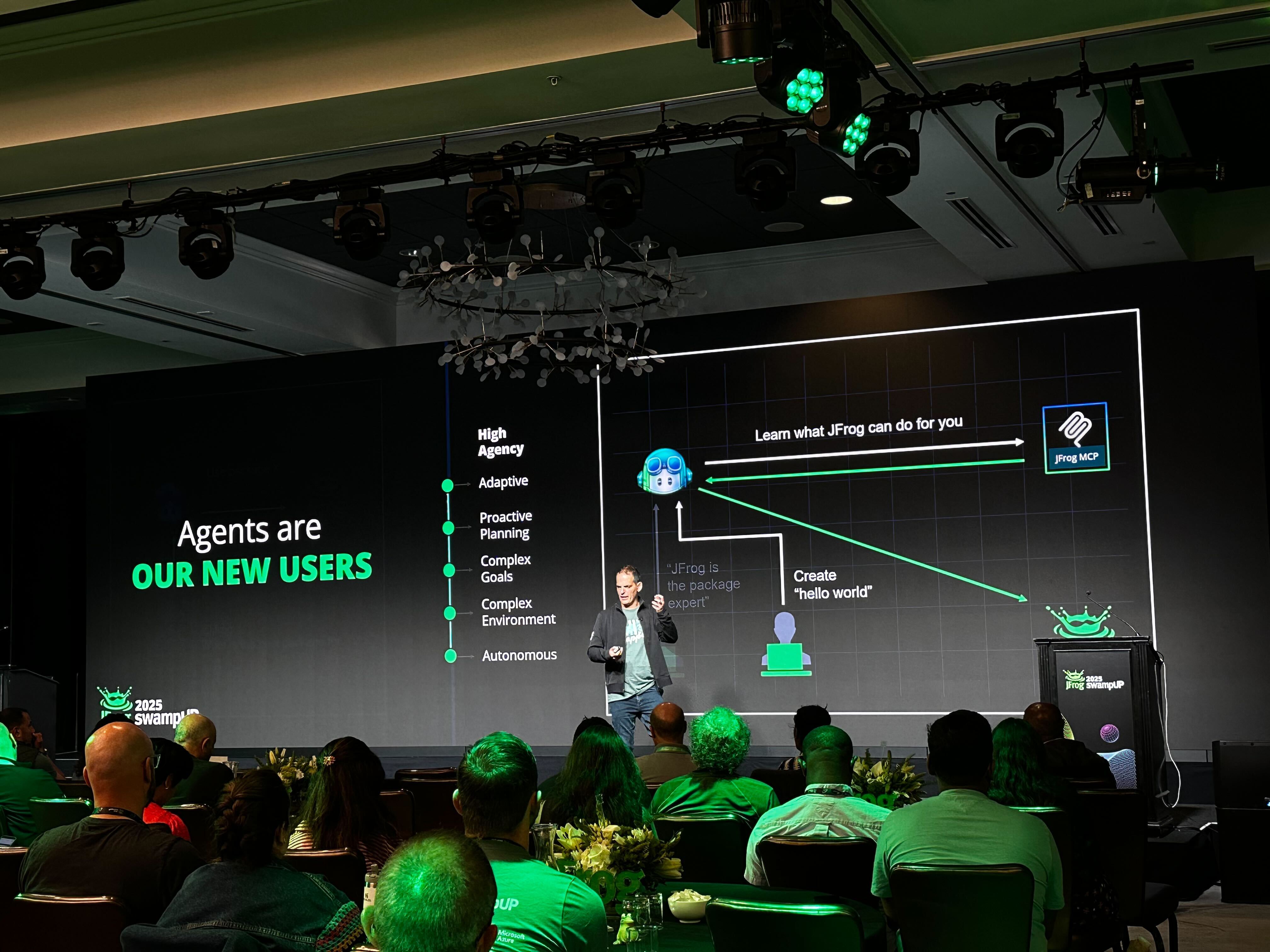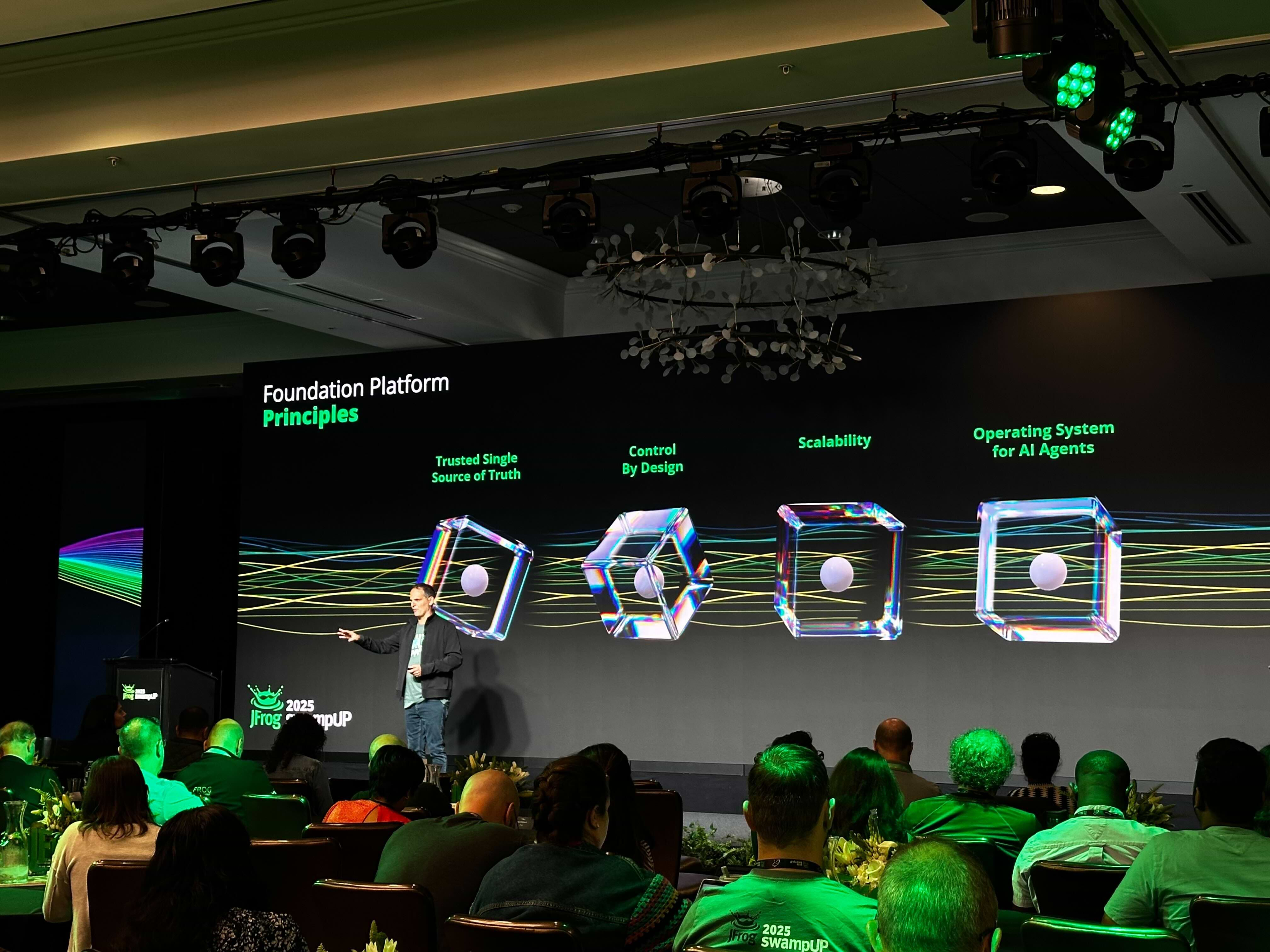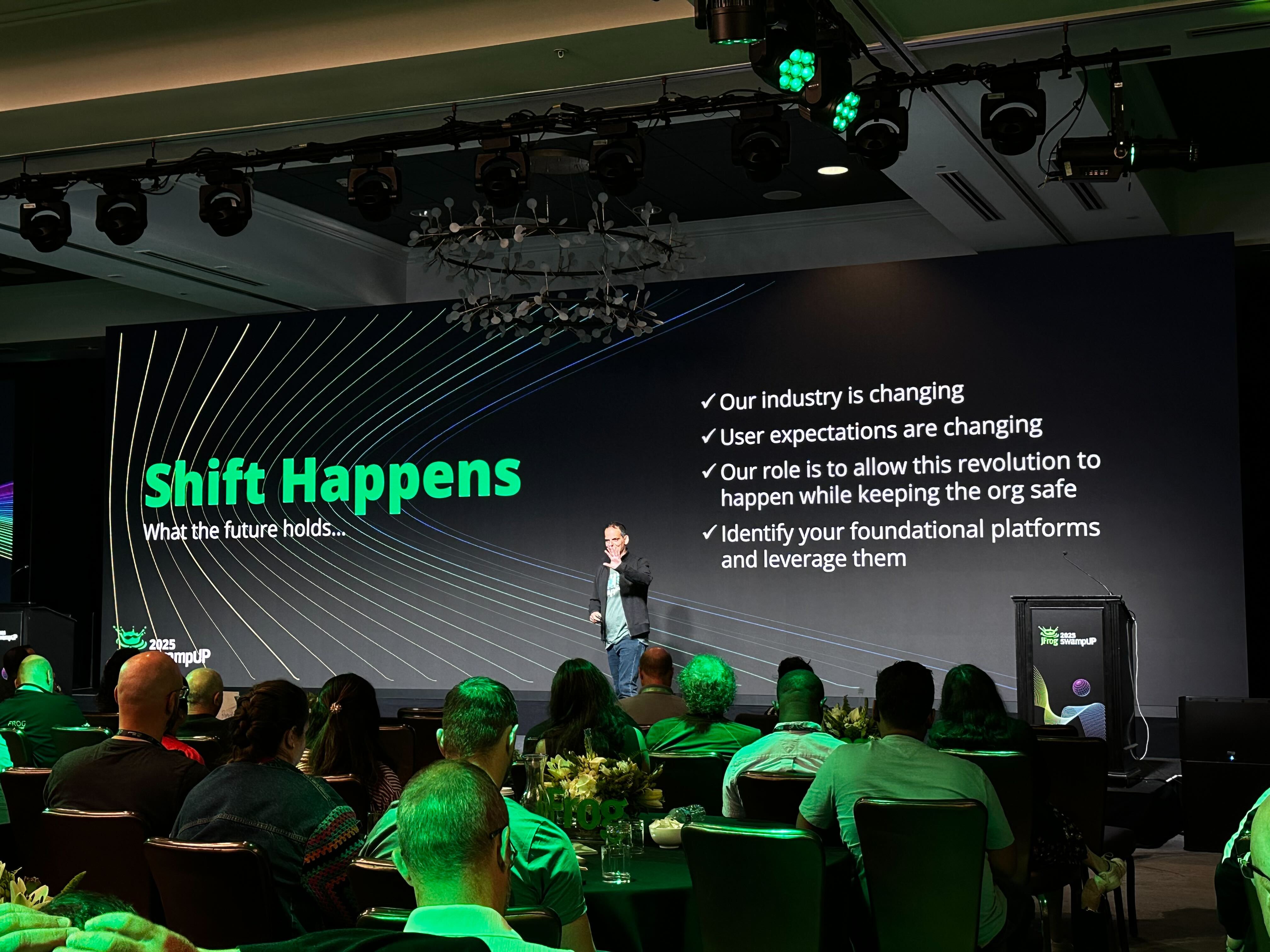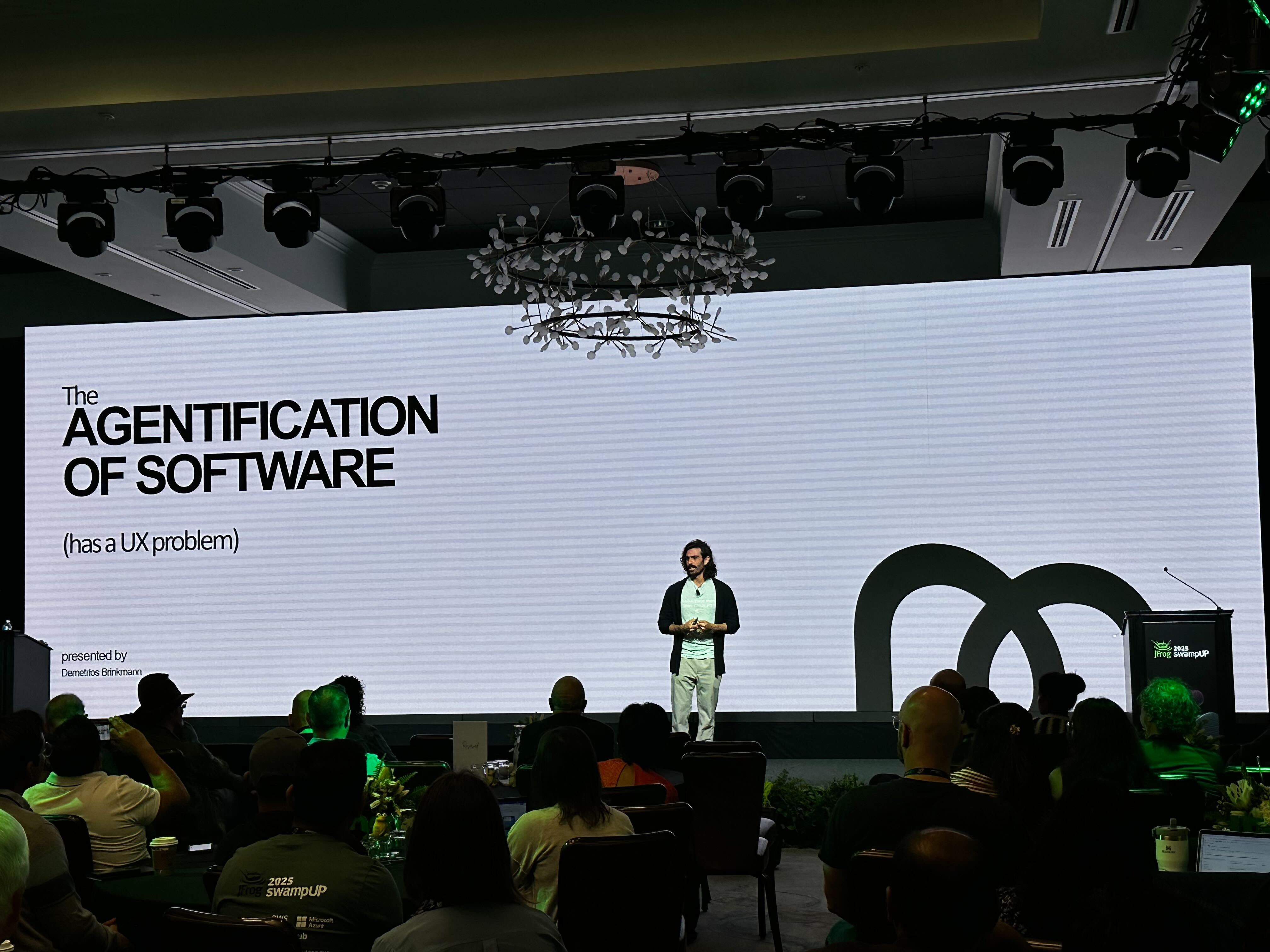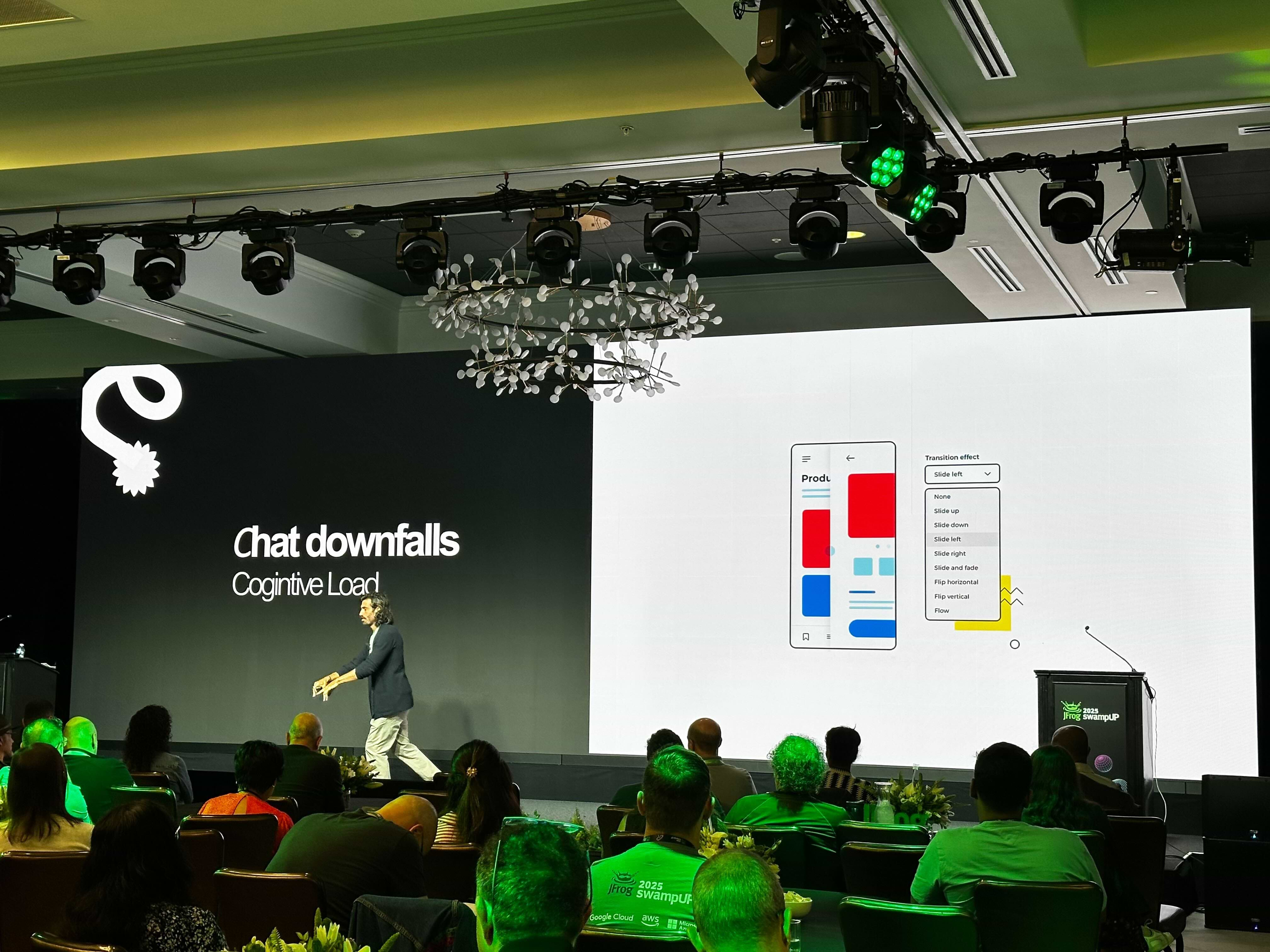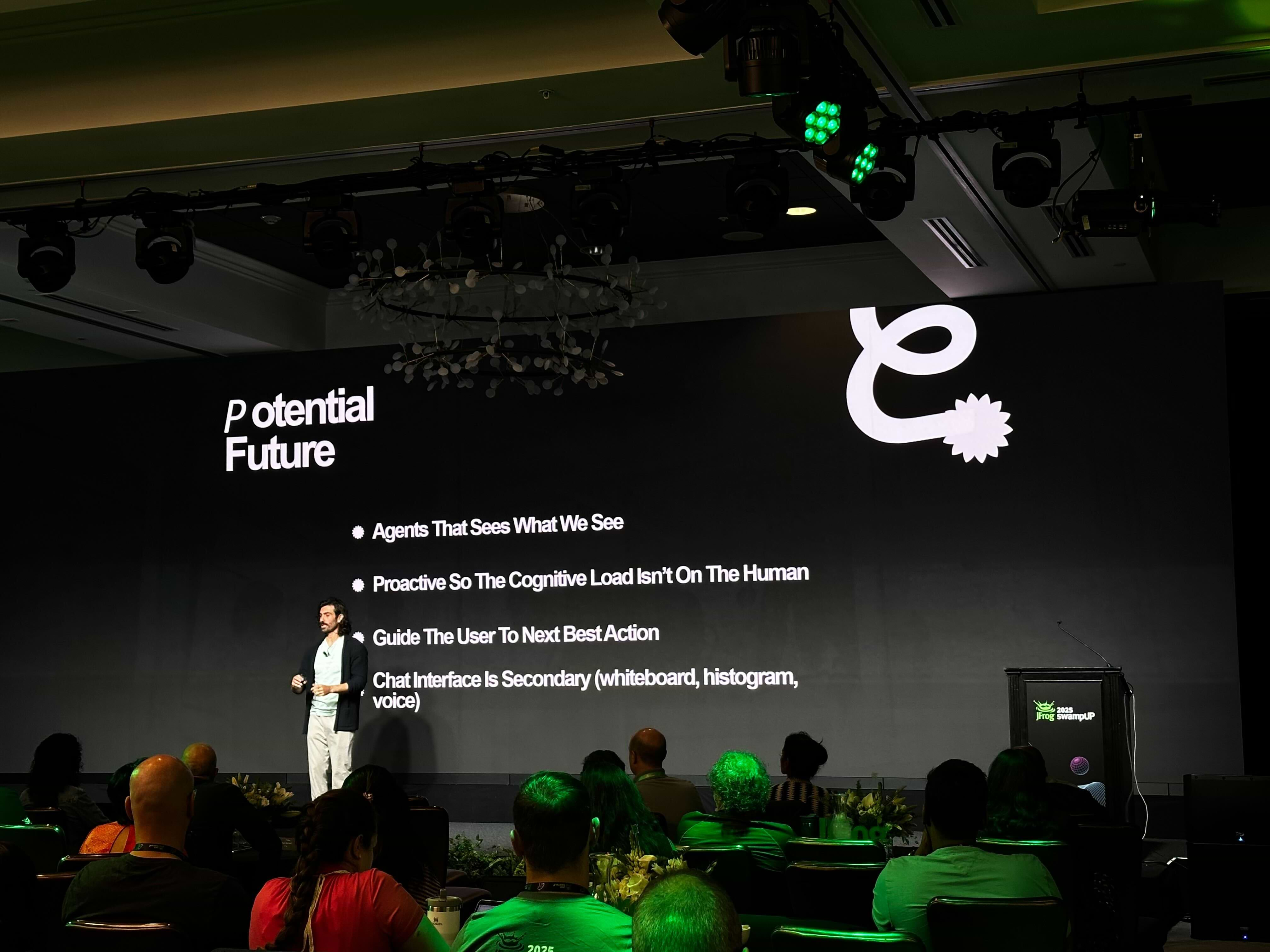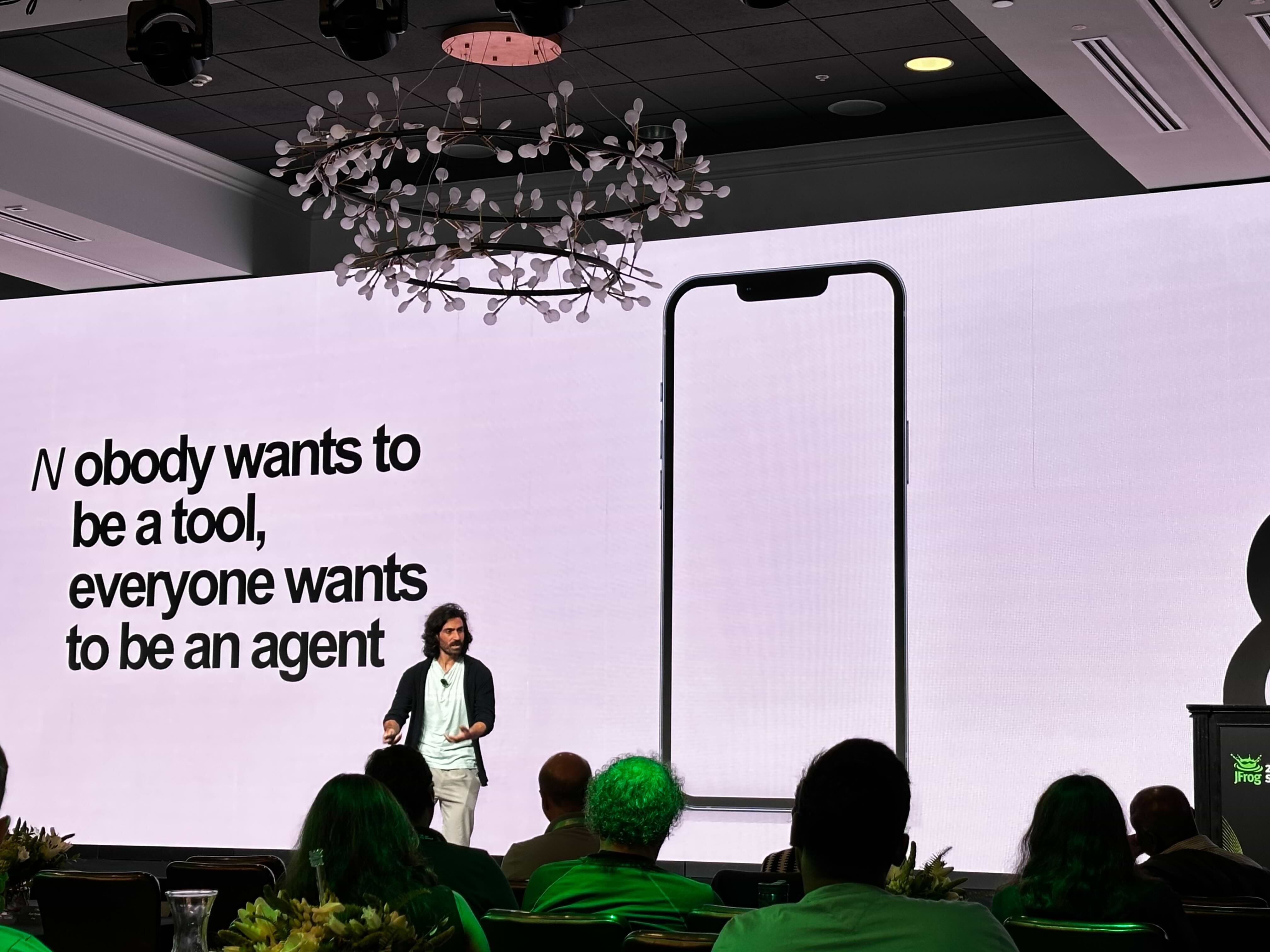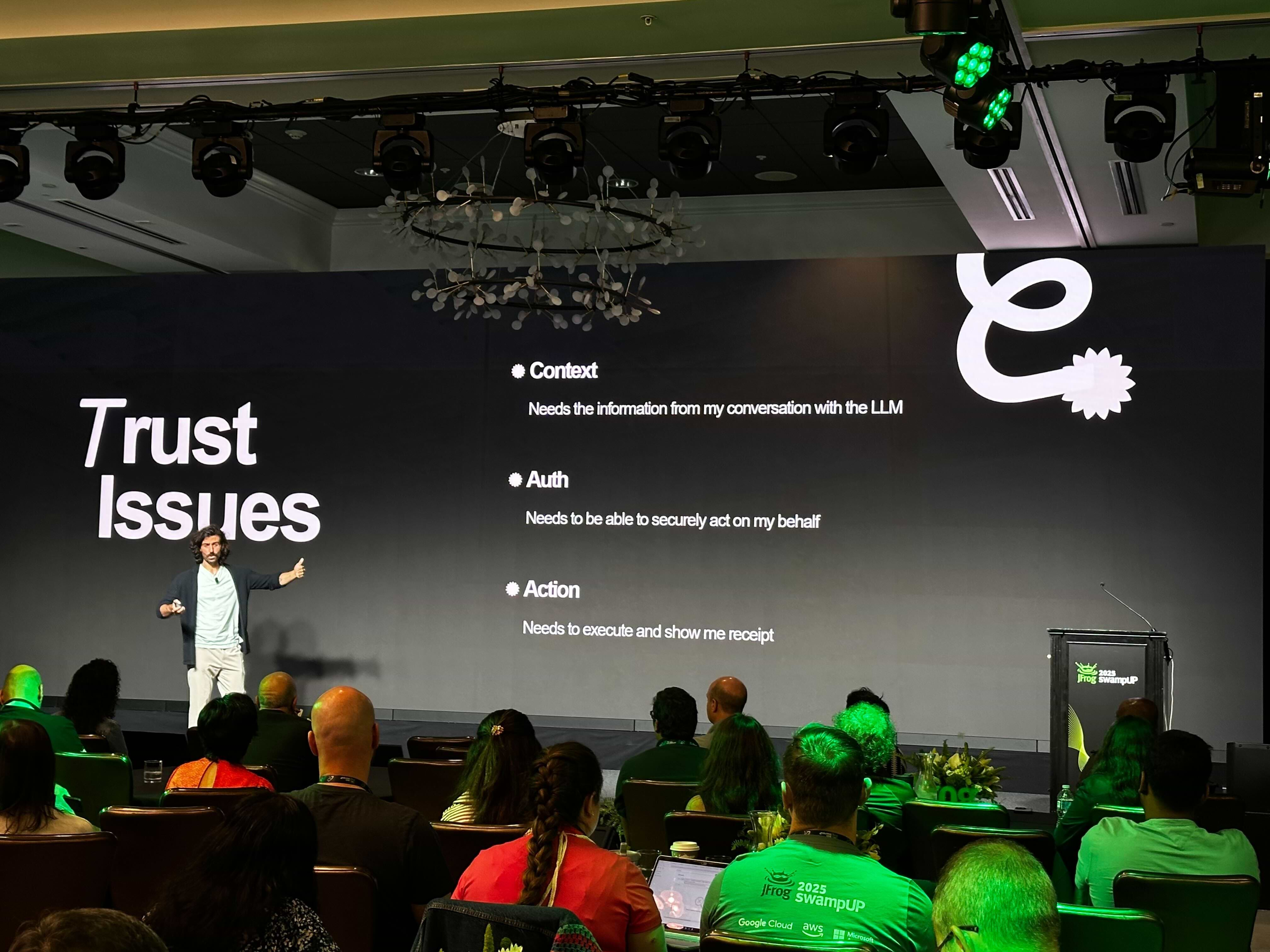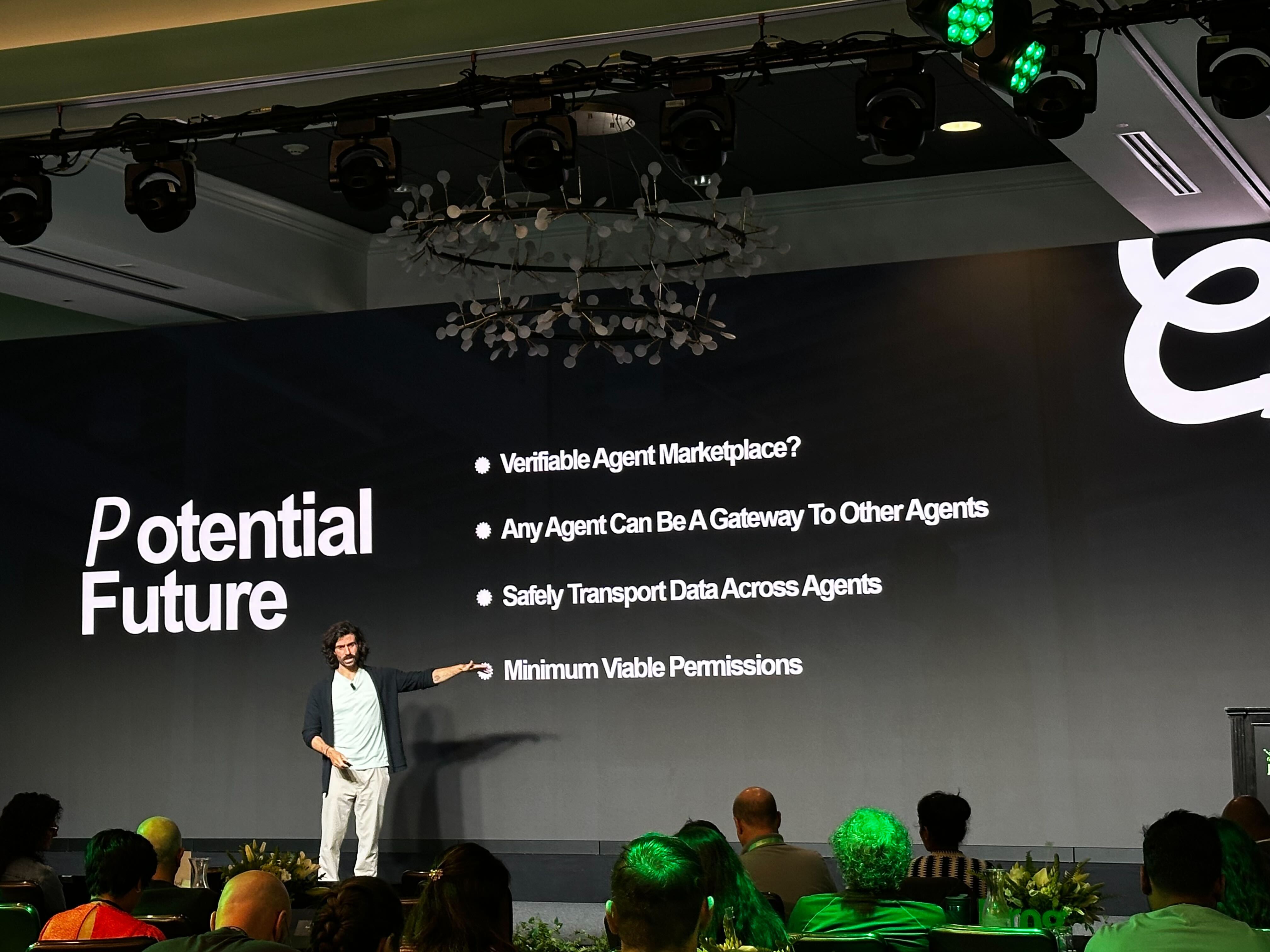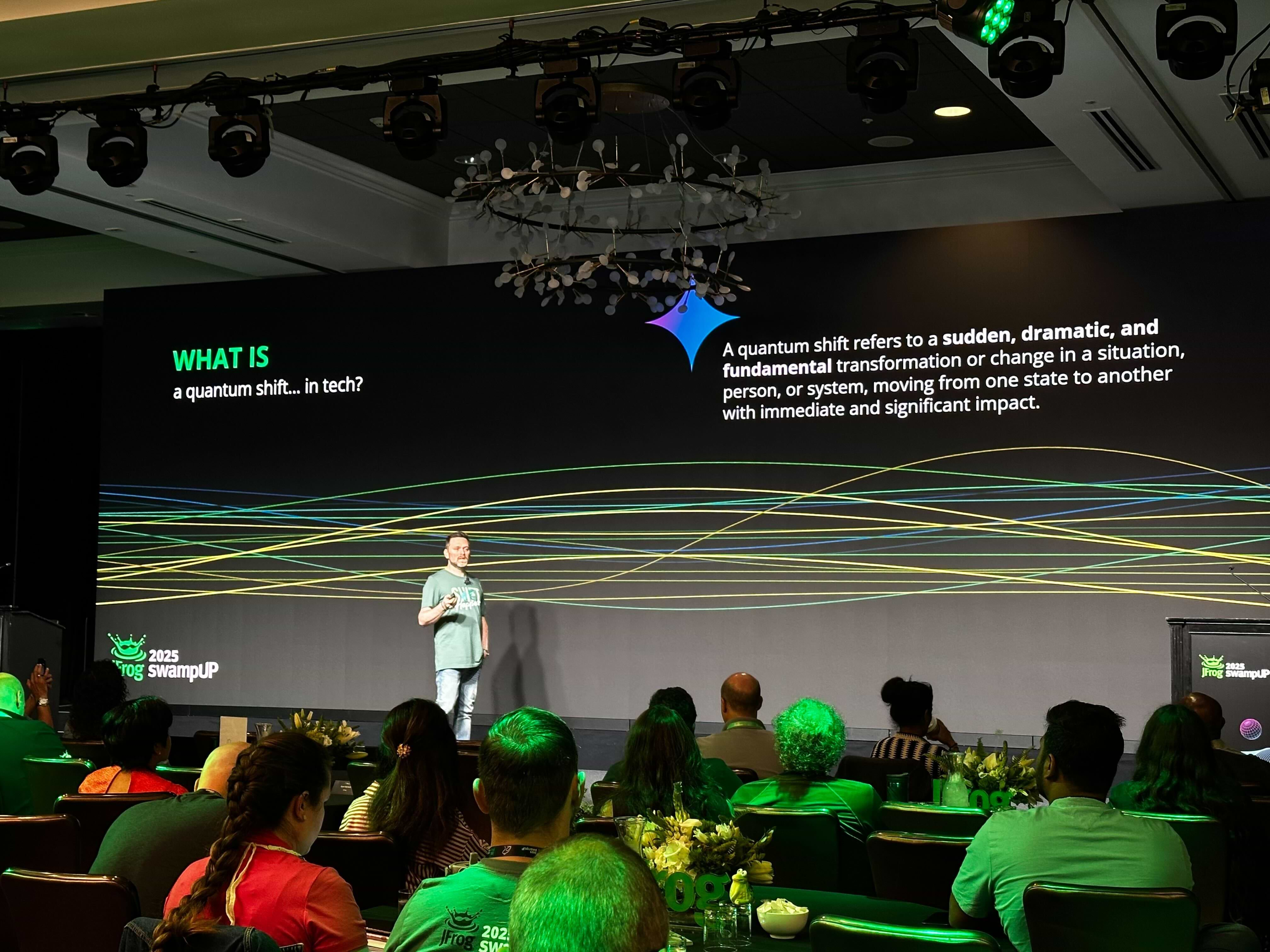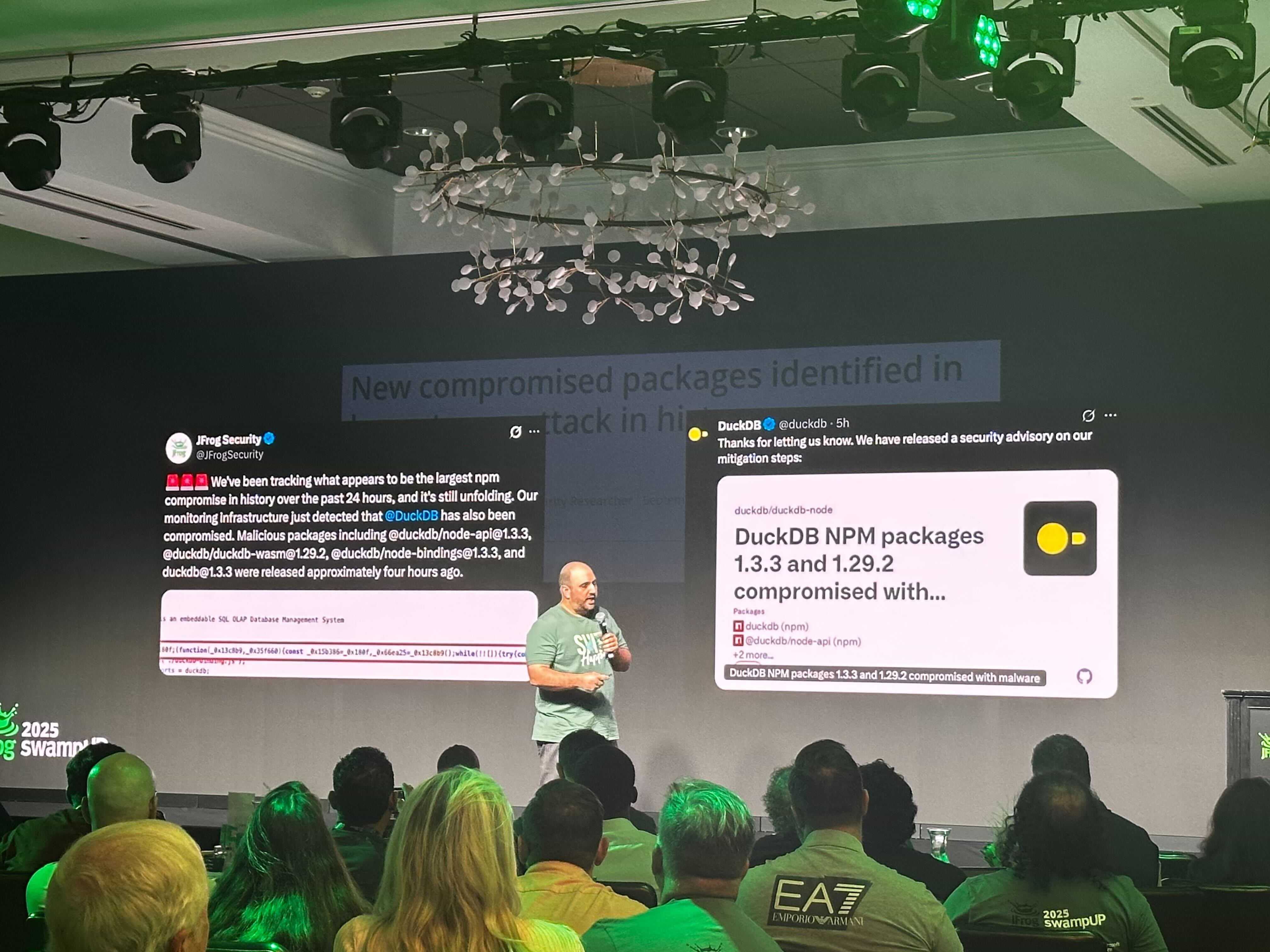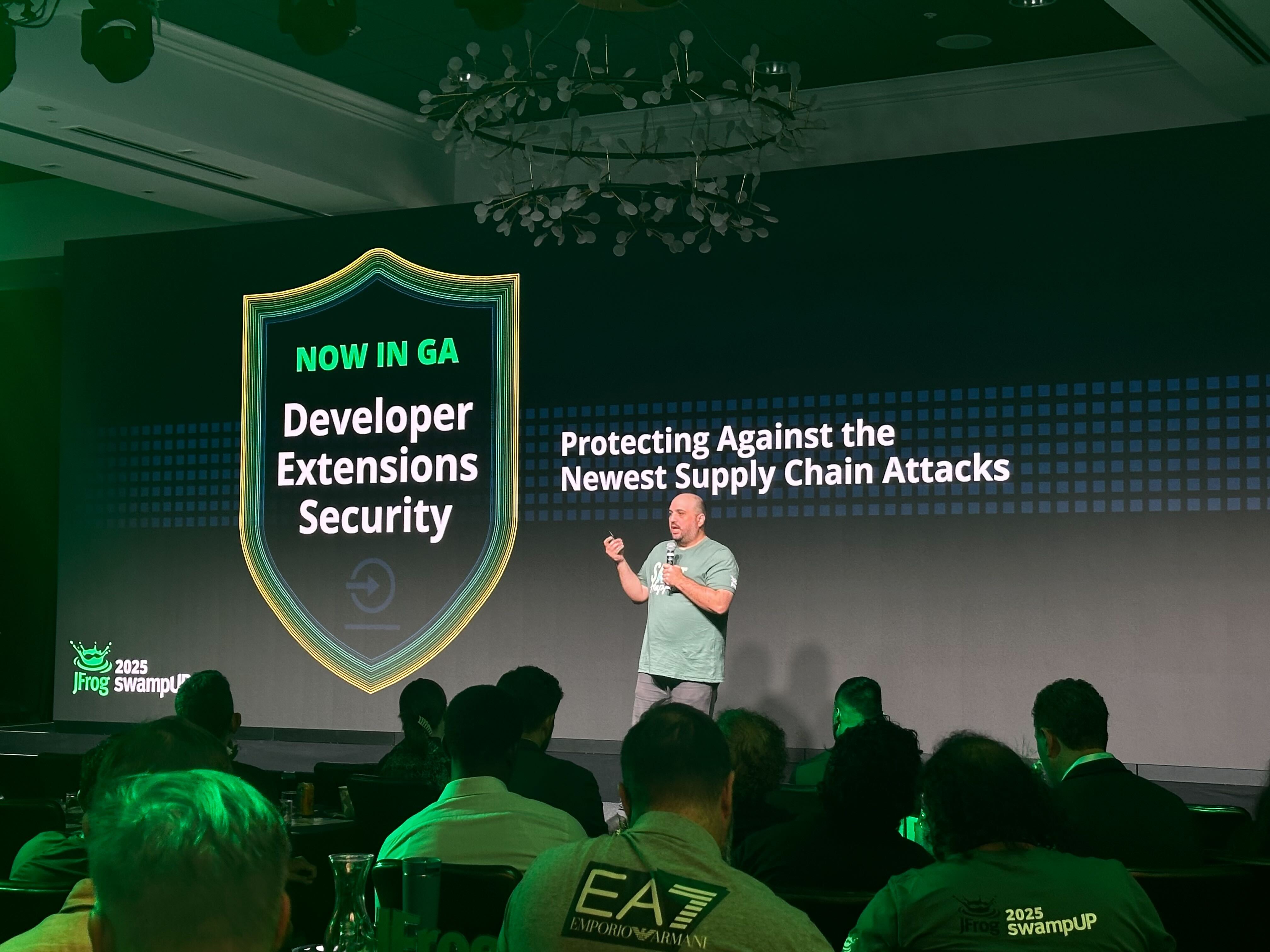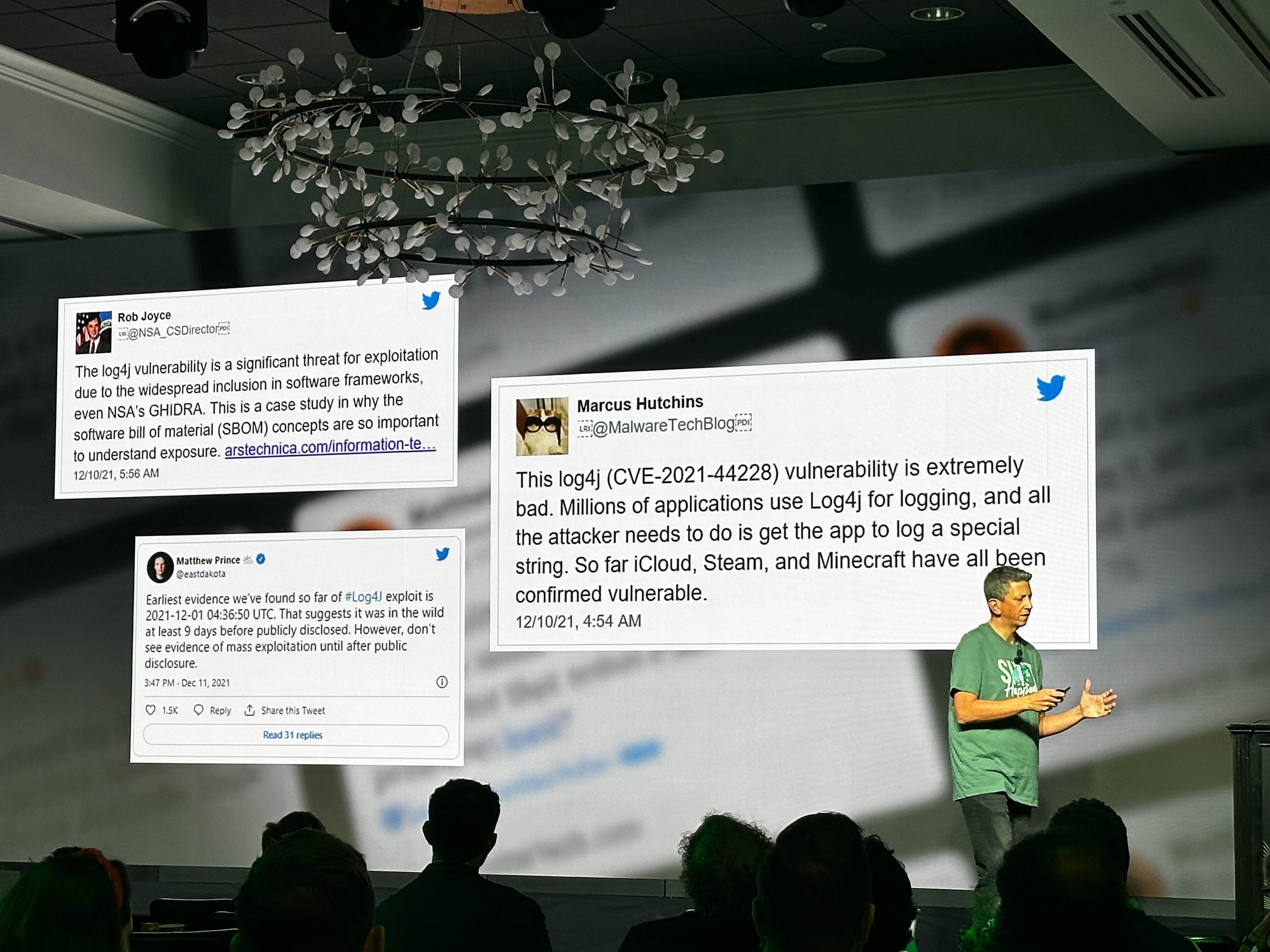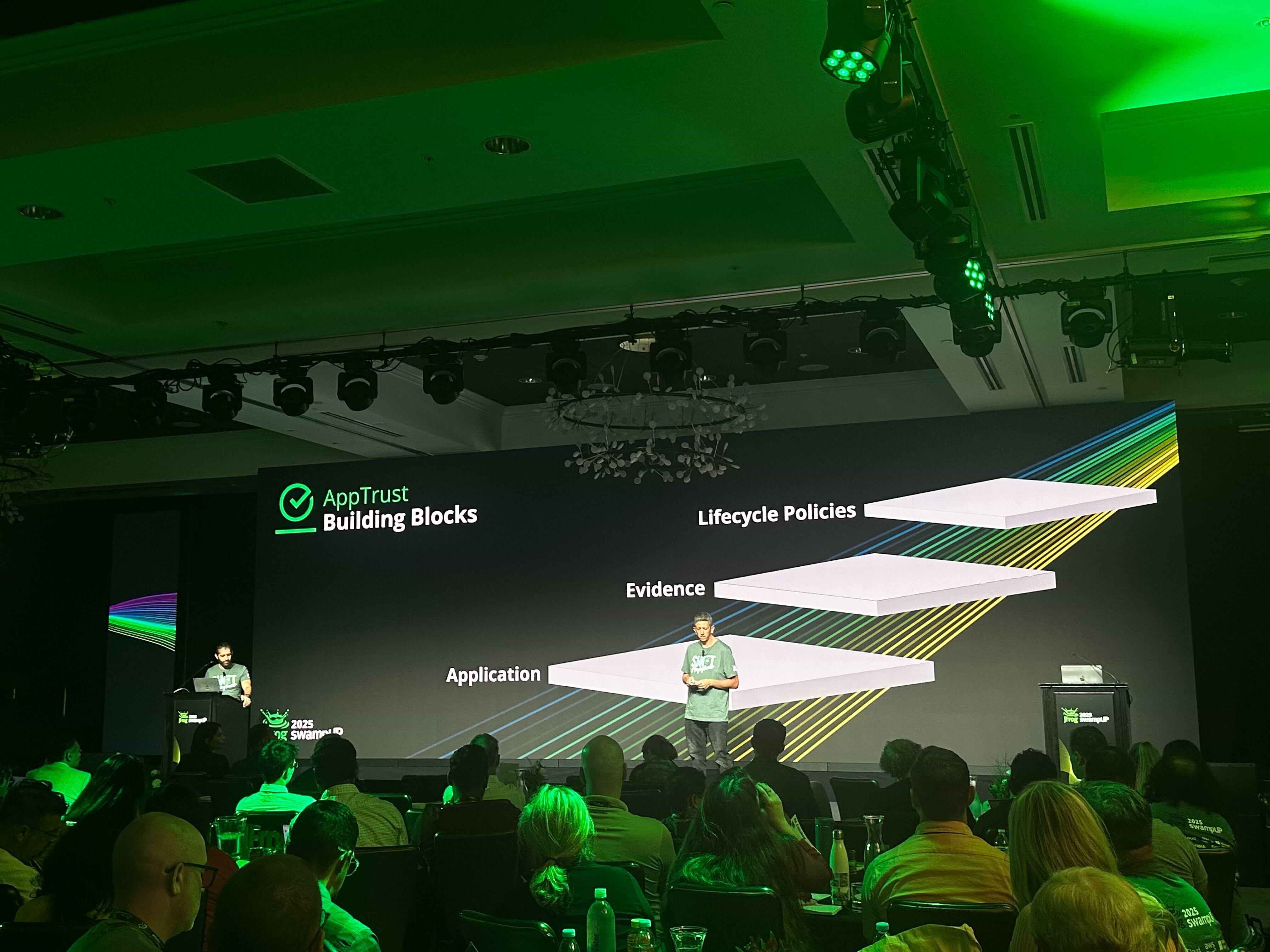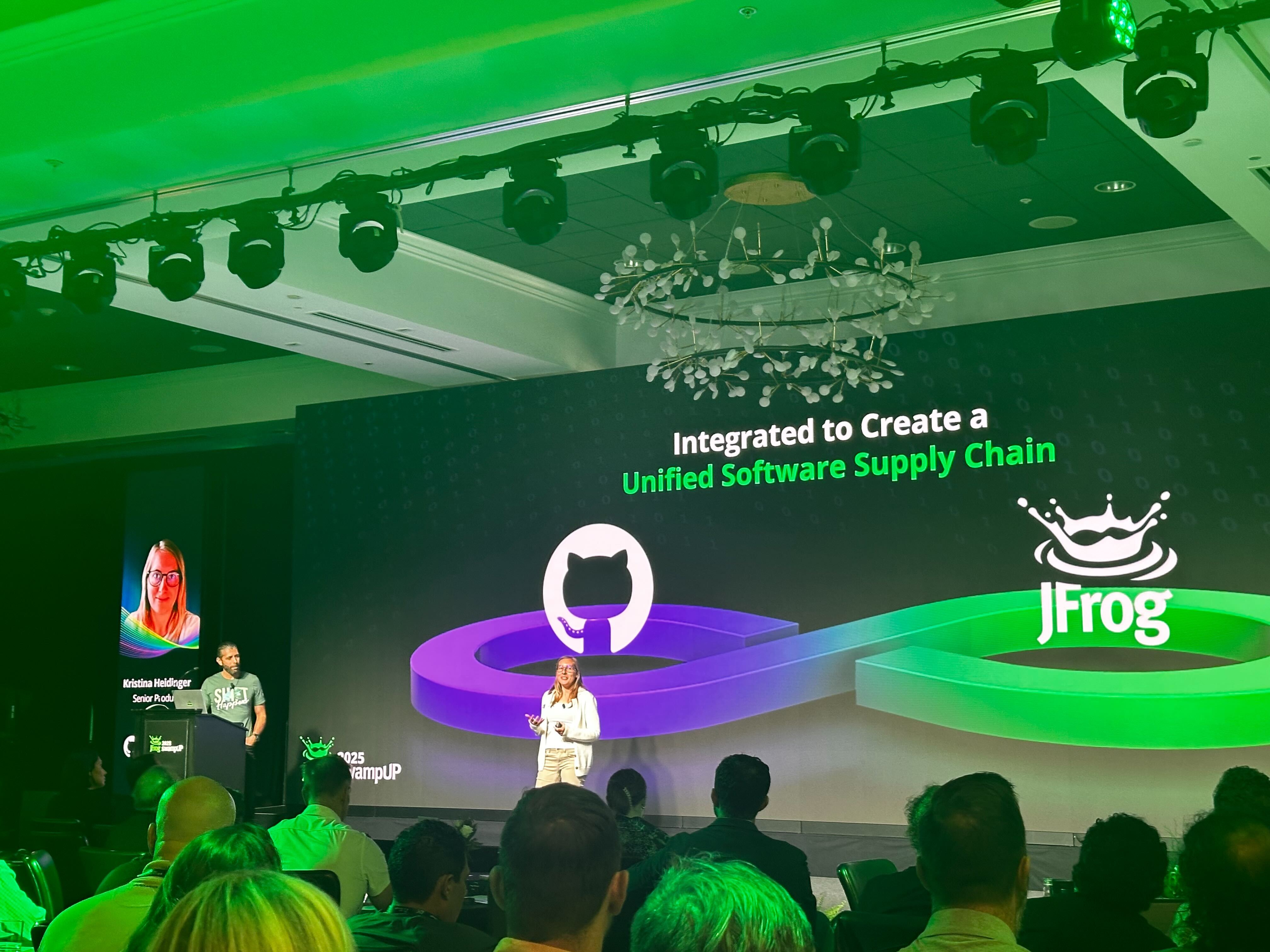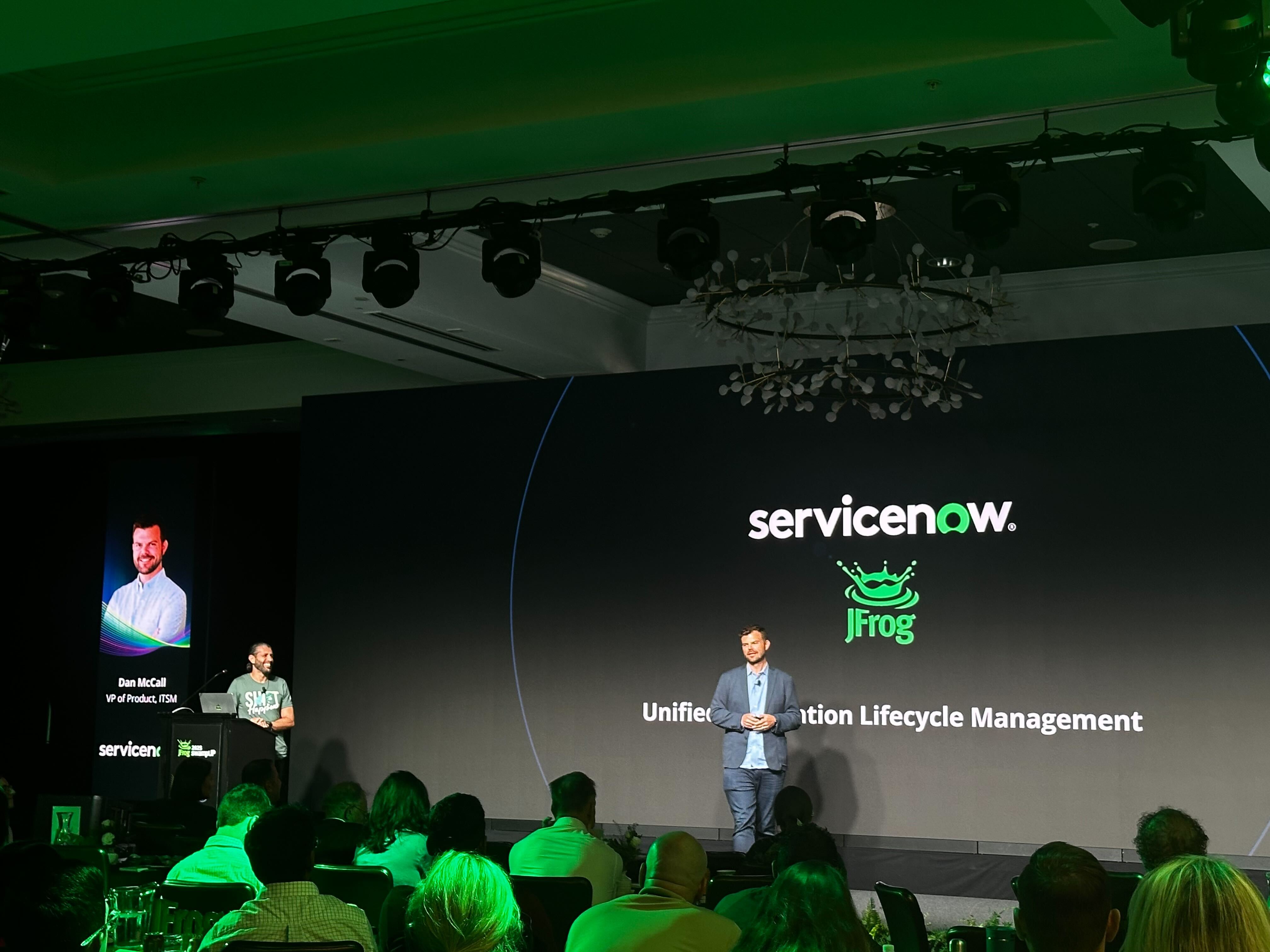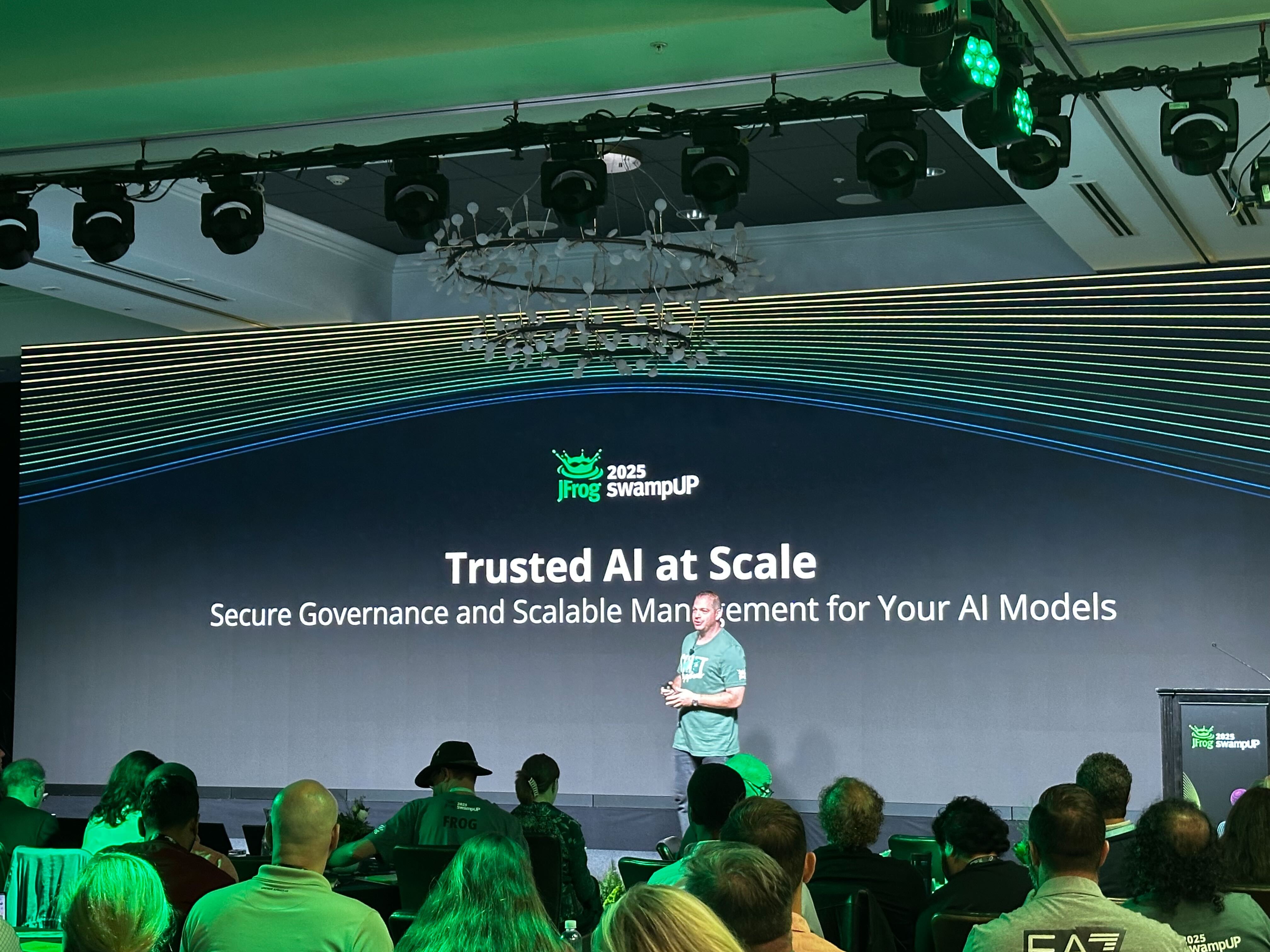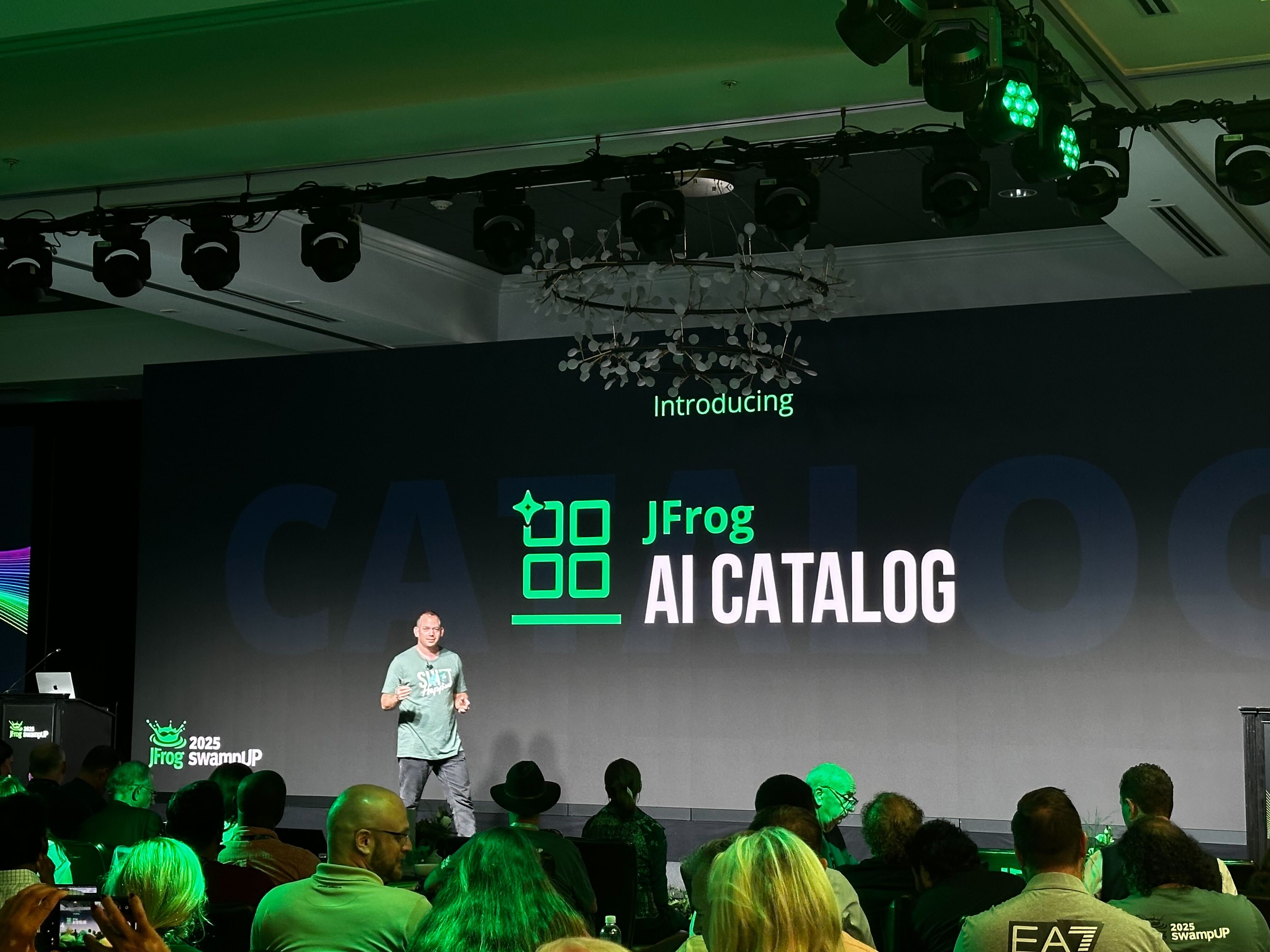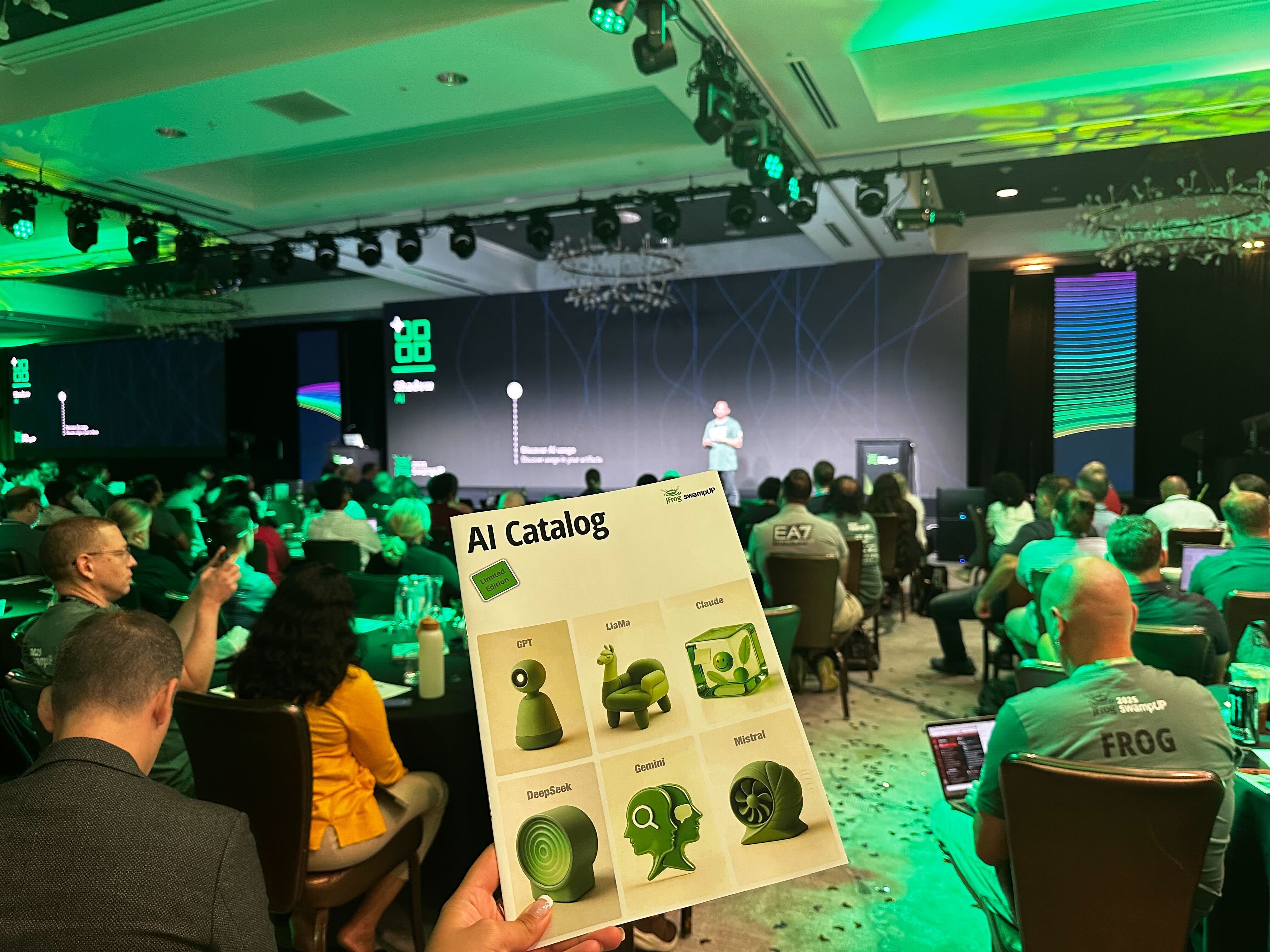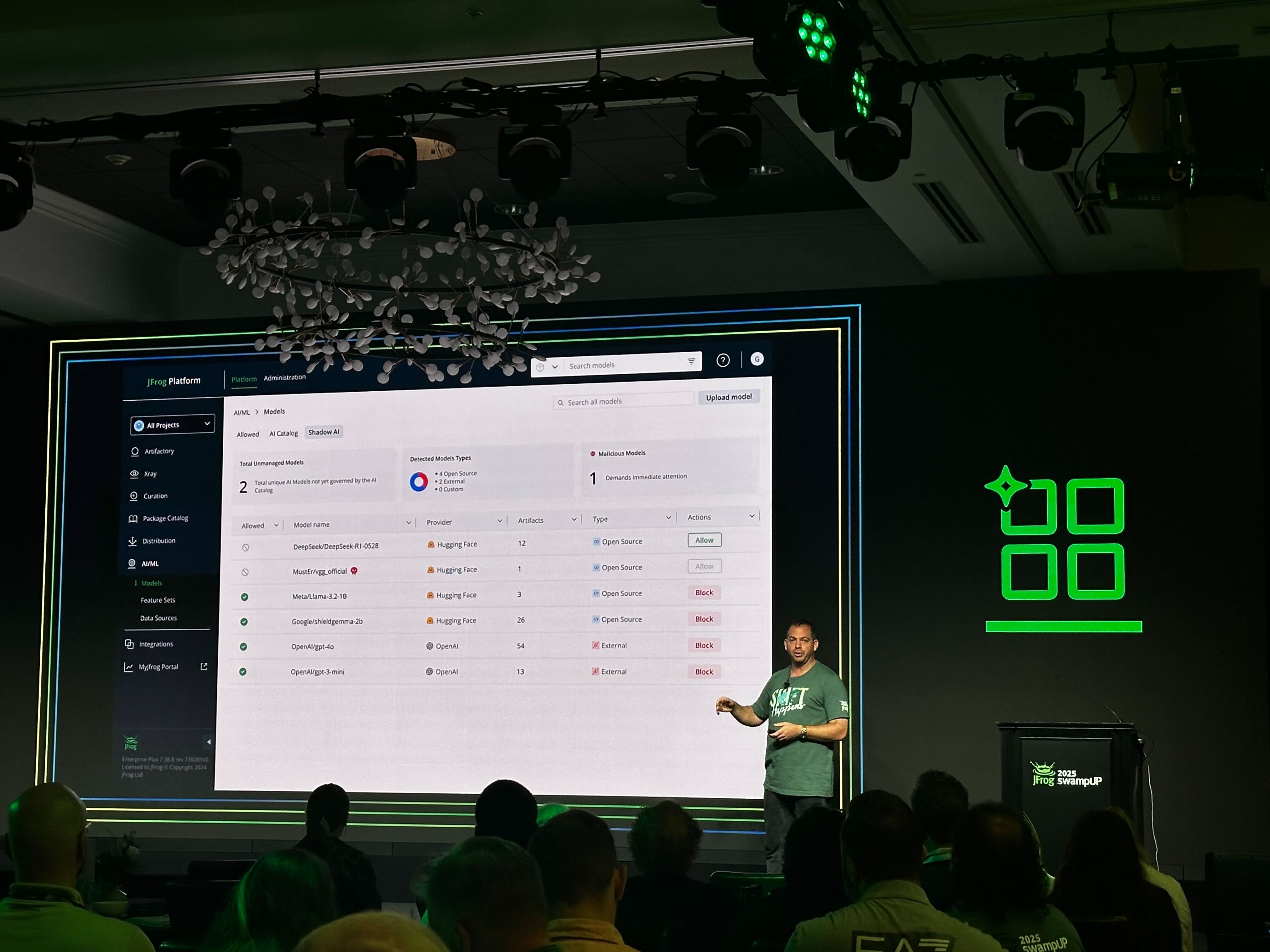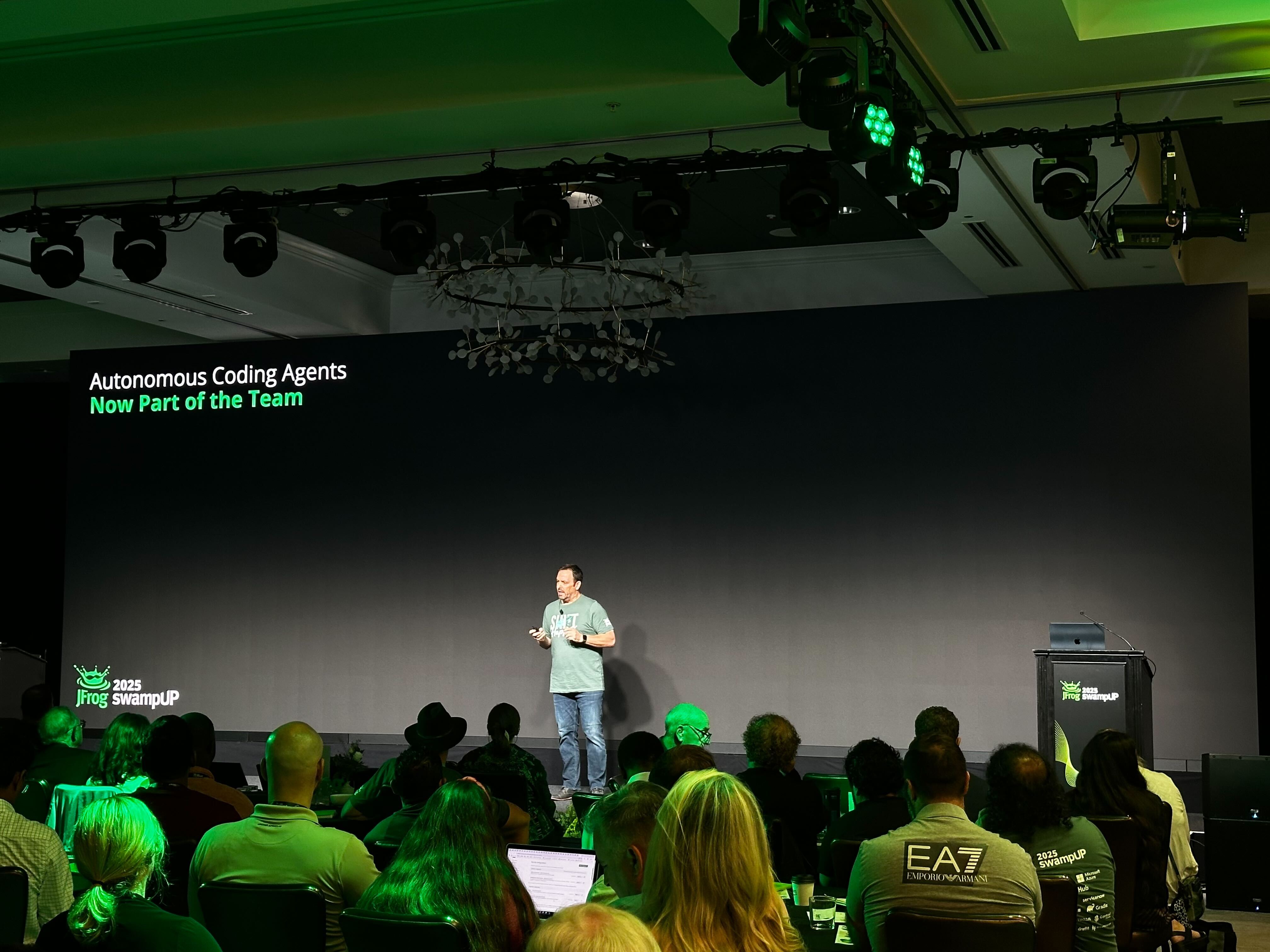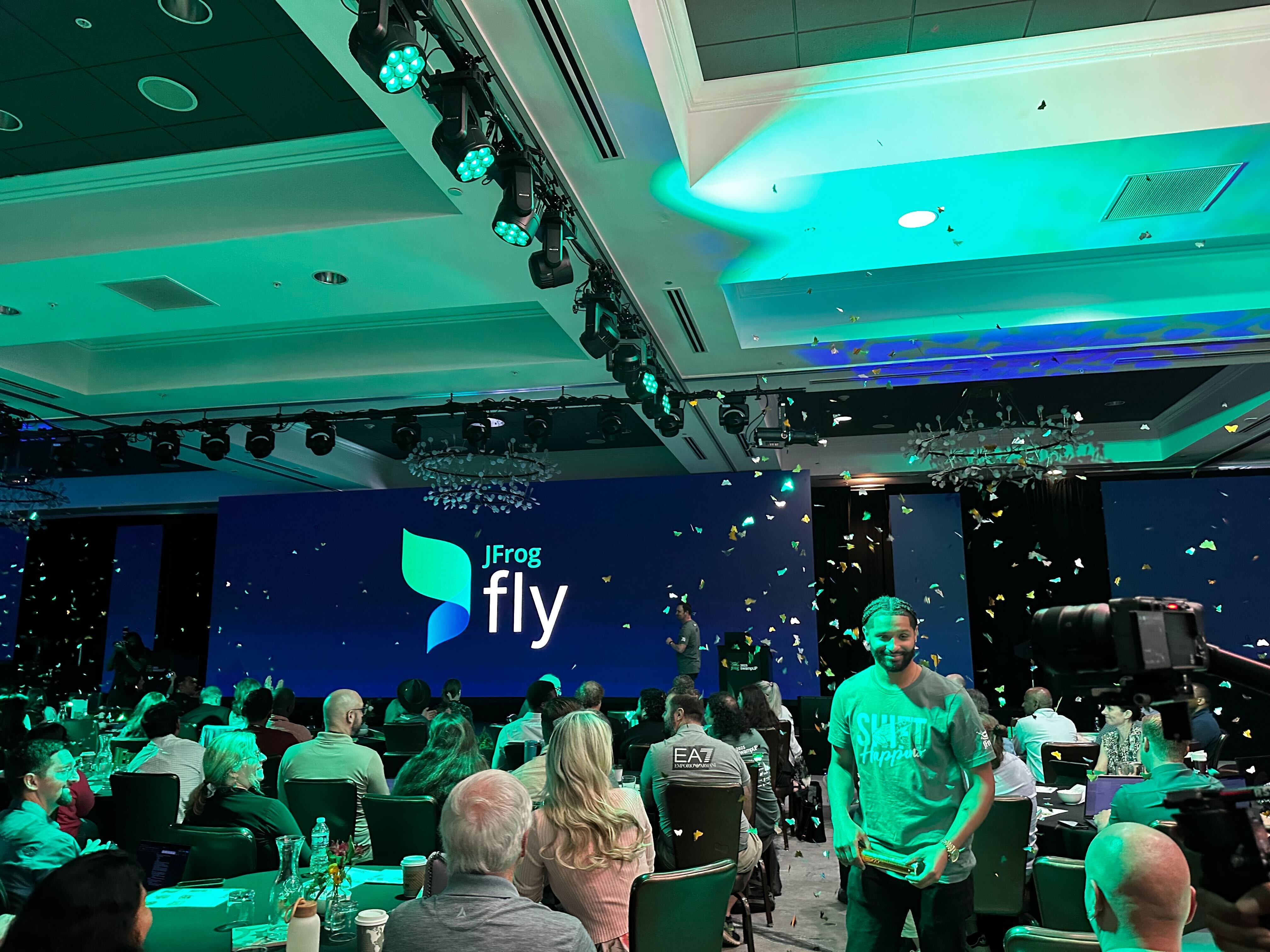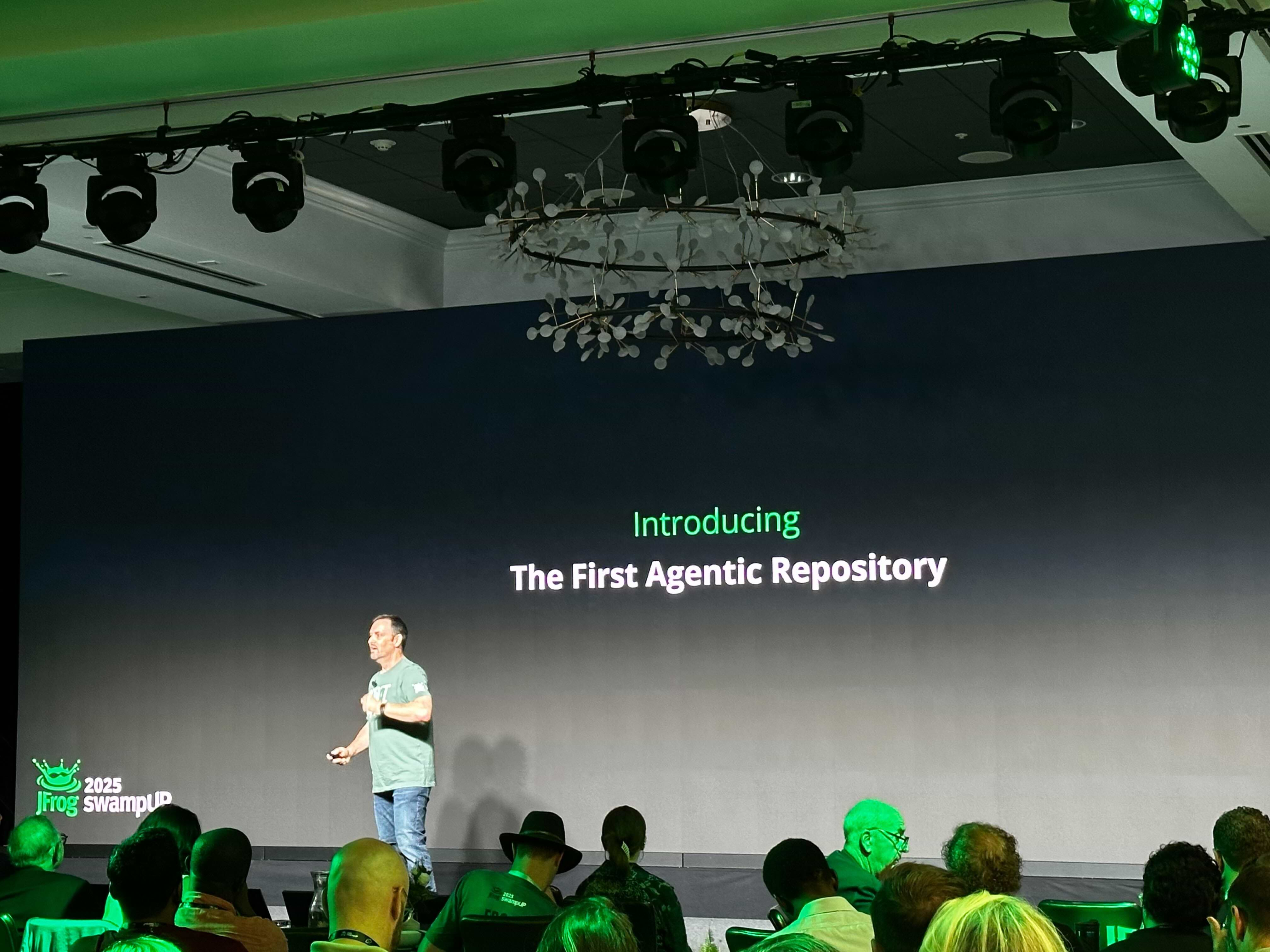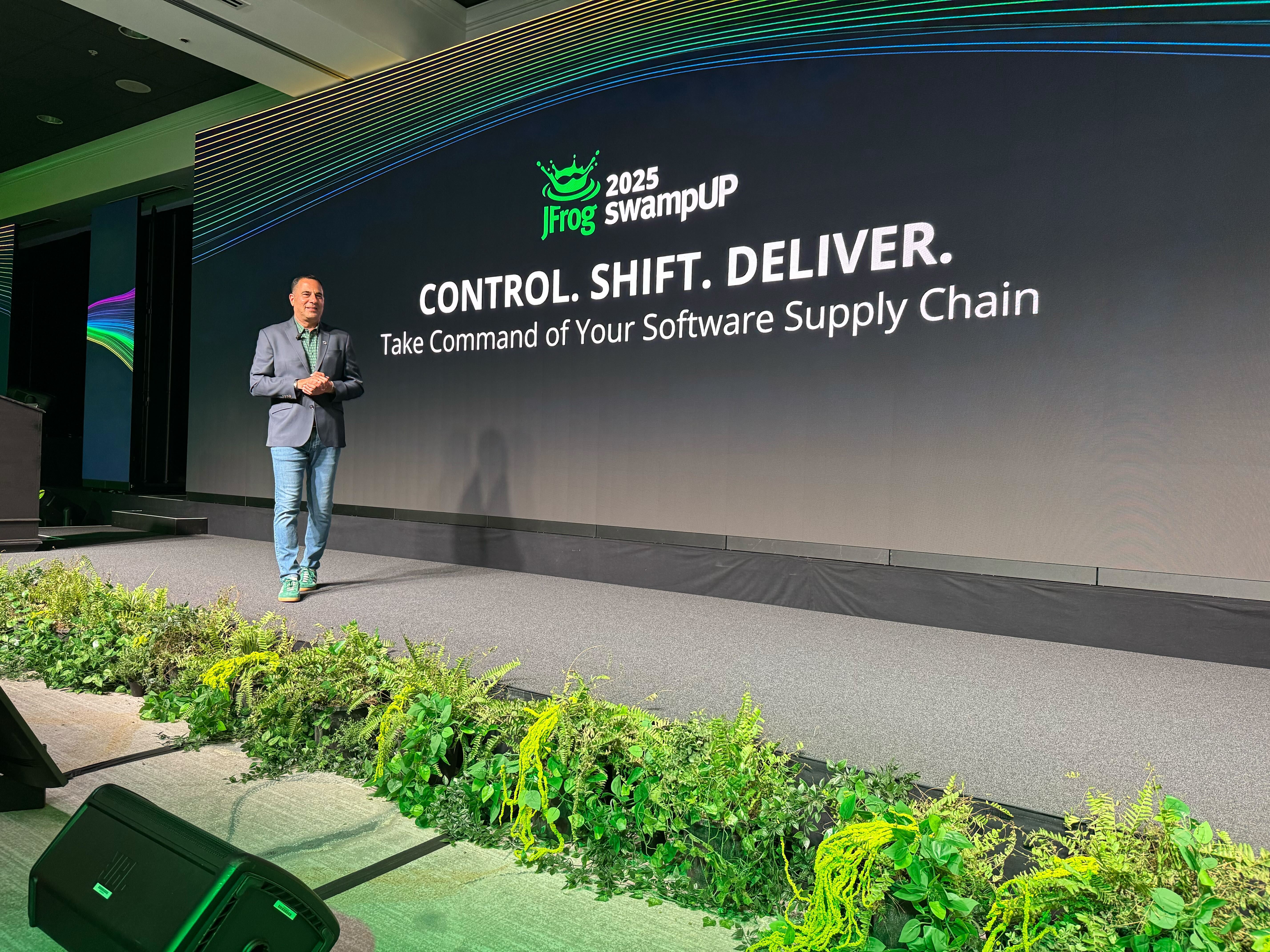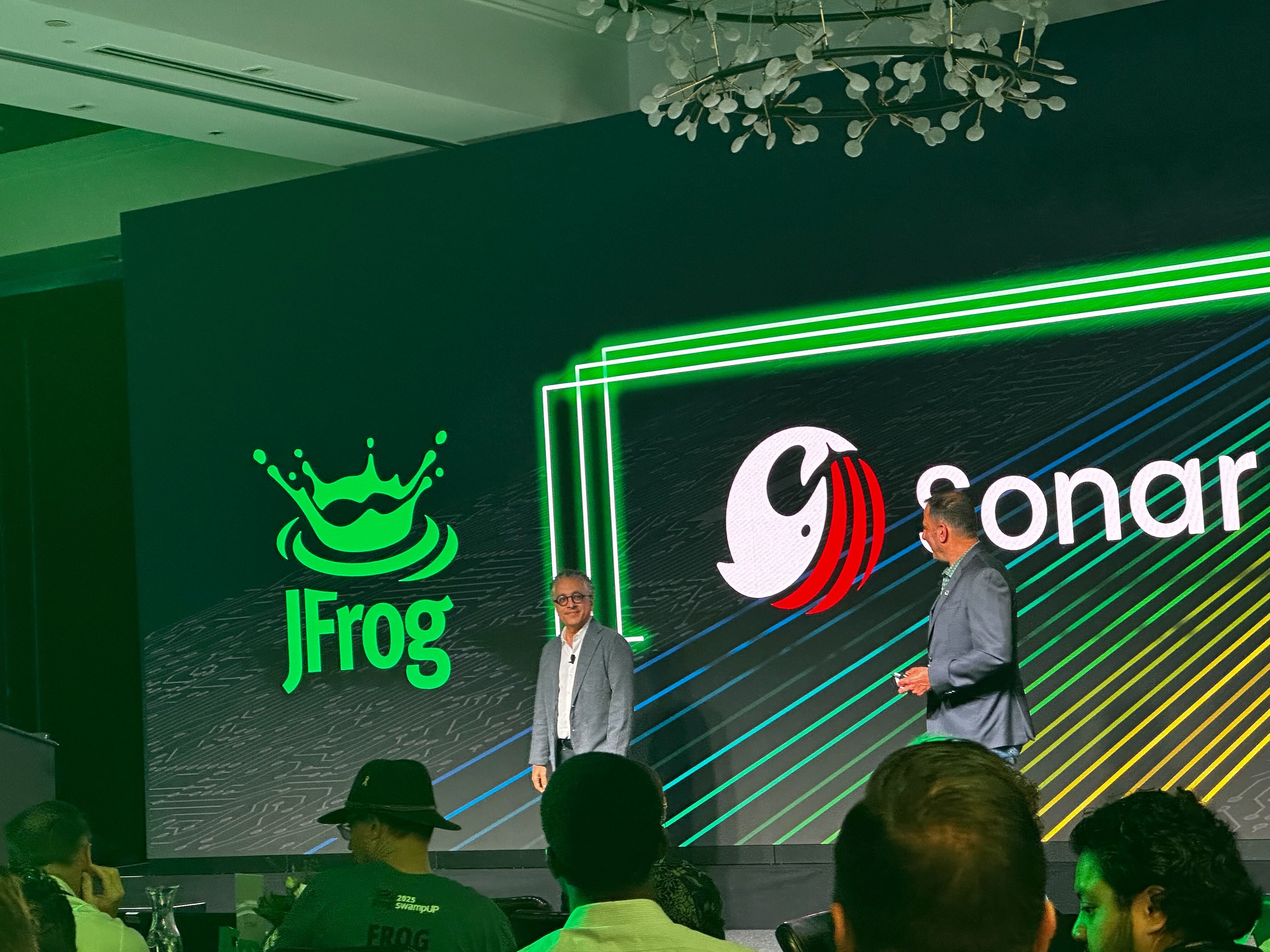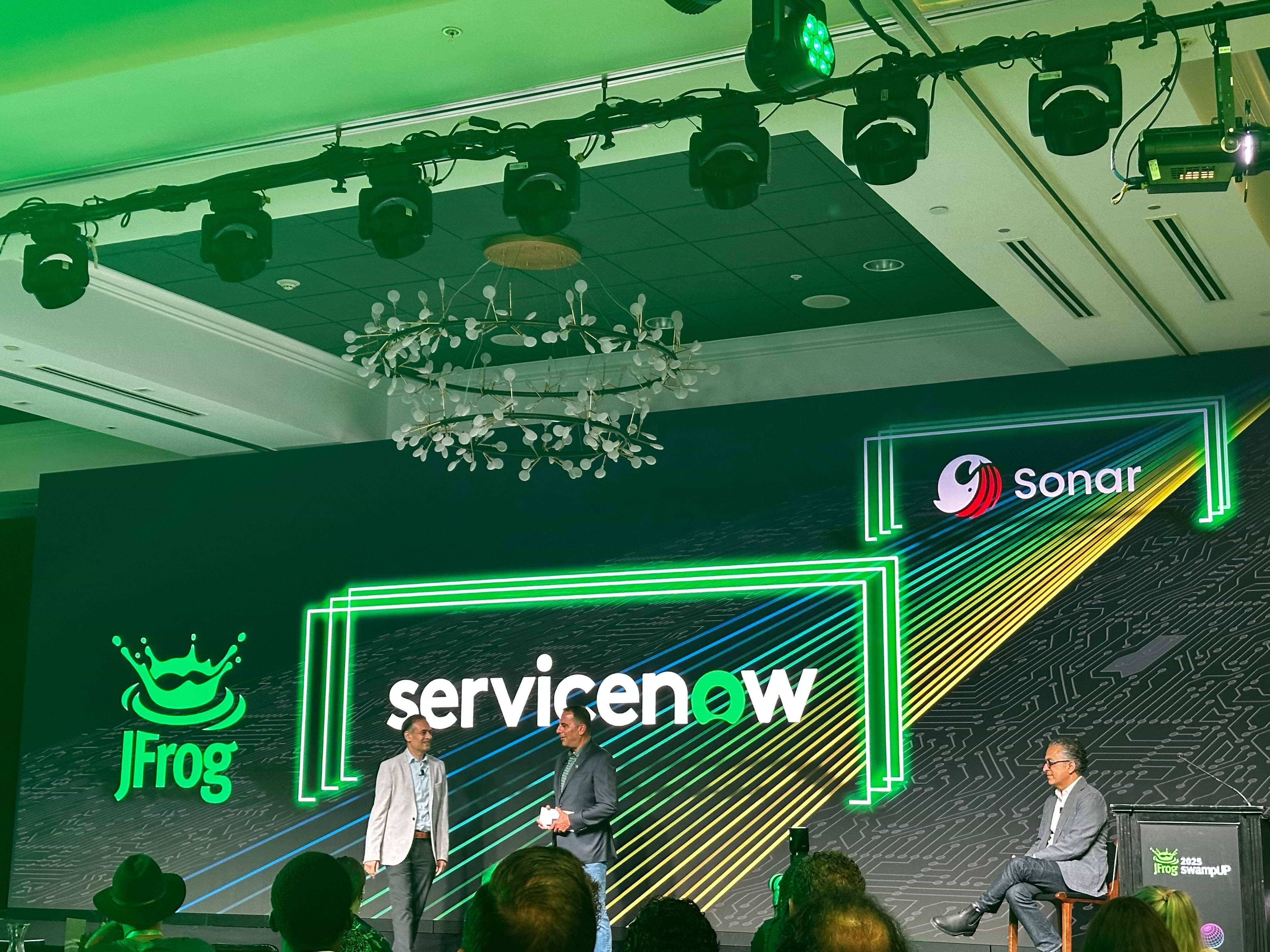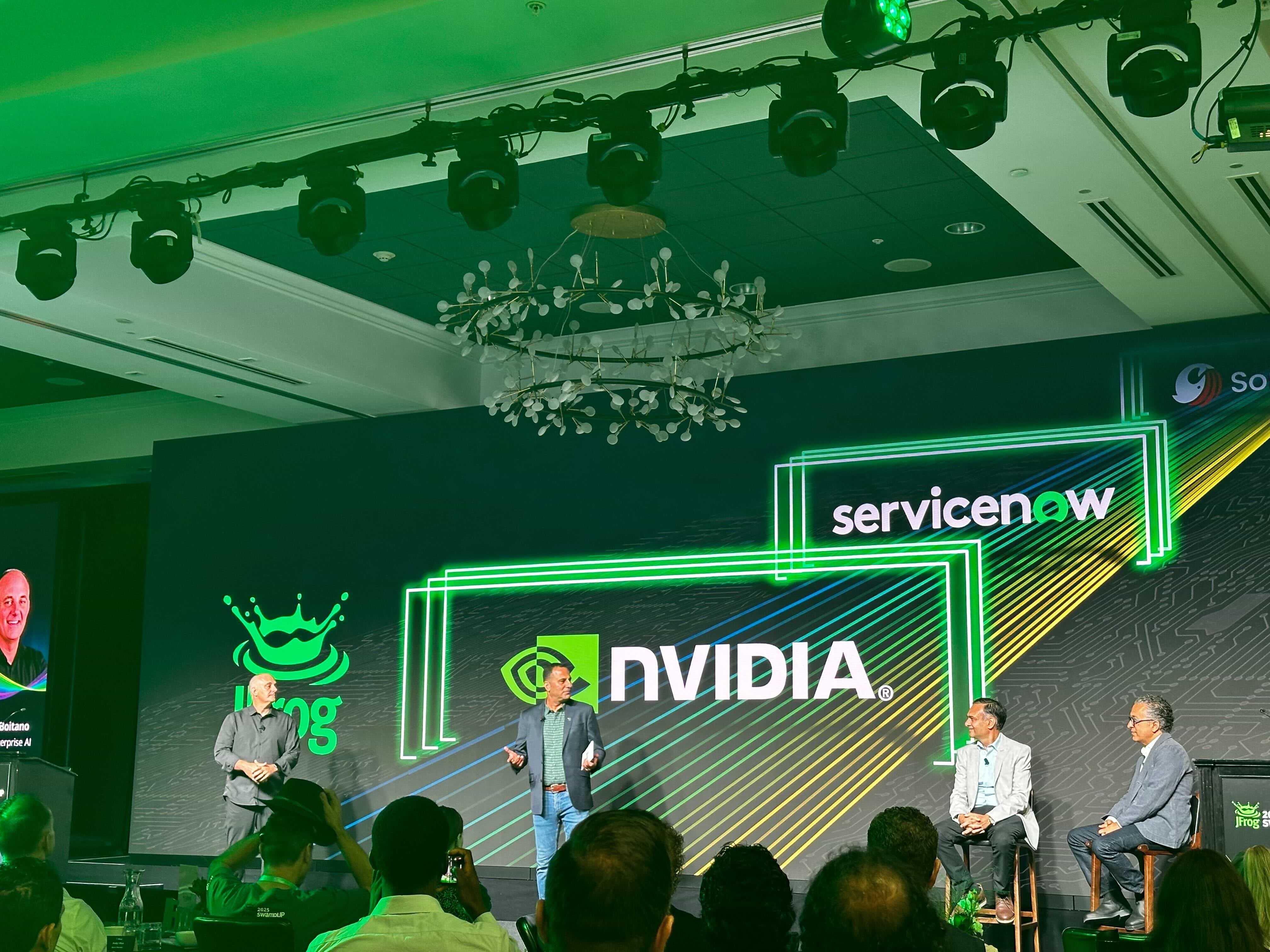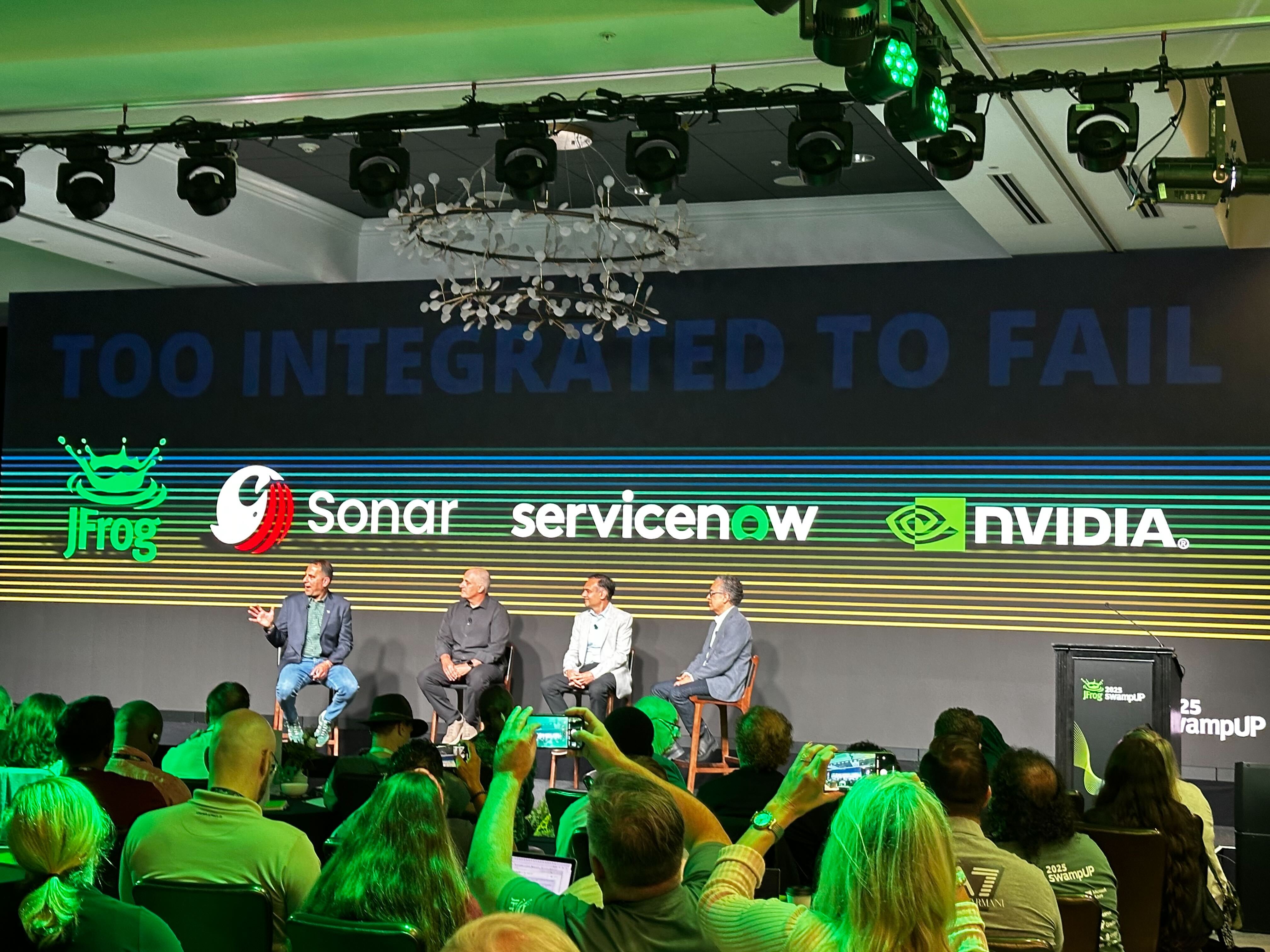JFrog swampUP 2025: News and Updates Live From the Show Floor
Live updates from this event have concluded.
JFrog’s annual user conference, swampUP 2025, is the ultimate gathering of the brightest minds in DevOps, DevSecOps, and MLOps where they exchange ideas, insights and practical strategies for navigating this transformation while amplifying trust, traceability, and transparency in the era of intelligent software. Here are live keynote updates coming from the event in Napa, CA on September 9-10 2025:
Conference Day 2, September 10th
[10:15 a.m.] Redefining Openness in the Age of AI: Why Integration is the New Innovation
Gal Marder | JFrog Chief Strategy Officer
Overview
AI is reshaping not just how we build software, but how we or our machines connect, collaborate, and integrate across the ecosystem. From JFrog’s earliest days with Jenkins, Maven, and Docker, to today’s partnerships with HuggingFace, GitHub, Nvidia, and beyond, we’ve embraced a philosophy we call “Too Integrated to Fail” allowing developers the freedom to choose and avoid any vendor lock-in. AI is rewriting the rules. Data silos are locking down. New integration models like MCP and A2A are rising. What it means to be “open” is no longer the same and it’s reshaping how you design your products, architect your systems, and decide which software you can truly trust.
In this session, we explore how AI is transforming integrations and partnerships, why being open and integrative matters more than ever, and what it means for the future of the tools you use. If you care about enabling the AI revolution in Software Delivery while keeping your organization safe and compliant, this talk shows you why being open is no longer optional, they’re existential!
Sound bites from the session
- Gal aims to take a more scientific approach to the looming quantum shift — and by “scientific” he jokes that his research included gauging the content of the billboards on the 101 in northern California, which almost entirely focused on AI.
- Next Gal touches on the “too integrated to fail” philosophy, which addresses pain, trust, and freedom of choice.
- Gal recalls last year’s swampUP event, where many were excited about the integration with GitHub Copilot. “It was adopted, but not to the level we wanted,” he said. After some thought and conversations with partners and customers, the conclusion: “We ignored the agentic gap.”
- Gal mentions that Copilot was not given a lot of agency into JFrog: the user had to tell Copilot to “go to JFrog”, which created a disappointing user experience to some users.
- With Agentic Remediation, announced yesterday, Gal says that this resolves the issue by starting to treat the agent as the user. Instead, the experience is: JFrog is the package expert, so treat them as an expert in packages. This way, the developer does not have to ask about packages and the packages just appear as they code.
This underscores one of Gal’s main points of emphasis: agents are our new users. - The agentic gap is all about how much agency we give AI agents. Essentially, agents are our new users of tools and platforms. “If we built integrations thinking that way, we get a different result.”
- Another way to look at it: the agents should be treated differently. They have their own pains. “We have to make sure they can do it in a trustable way,” Gal says. “Integrations in the AI era is more of an ‘interaction’ than an integration.”
- Business logic is being driven by agents, Gal says. Also, data is king, and protocols are evolving.
- There are four types of platforms taking part in this journey:
- Planning platforms
- Coding platforms
- SSC platforms
- Production platforms
- “These platforms become the foundation of everything we build,” Gal says.
- “Many of these interactions (between platforms) will be run by agents,” he says, adding that all of these platforms need to evolve together to succeed.
- “It’s our shared responsibility to allow this evolution, or revolution, but we must do it in a way that avoids significant risk for organizations,” he says.
- What are the challenges as we move forward? Gal introduces 3 main challenges: 1) Trust and Security (agents need to operate in a very sensitive environment, we need to control trust issues – taking a quote from Demetrios in the previous session), 2) Human Factor and Change Management (whenever there’s a high risk change being made, a human typically needs to be involved as a safeguard), and 3) Regulation vs. Innovation (many regulations coming around in the age of AI, such as the EU AI Act).
- The principles of foundational platforms should include:
- A trusted single source of truth
- Control by design
- Scalability
- Operating systems for AI agents
- Ultimately, our industry is changing, as are user expectations. Our role is to allow the revolution to happen while keeping organizations safe. Crucially, teams must identify their foundational platforms and leverage them. “This is what we need to do in order to make this shift happen.”
- Gal implores everyone in the audience to think about how platforms should be integrated with one another to better tackle the challenges we face today and tomorrow. He also invites the room to provide feedback: “If there are platforms you want JFrog to integrate with, we’d like that feedback so we can work on providing that integration to you.”
- That concludes the Day 2 morning keynotes!
[9:20 a.m.] The Agentification of Software (has a UX Problem)
Demetrios Brinkmann | Founder of MLOps Community
Overview
In a world where we’re increasingly interacting with machines through natural language, we’re facing a significant user experience problem: we’re overpromising and underdelivering. But we’re still in the very early stages of the AI evolution. In this keynote, we explore the path forward. Attendees will learn how the future state of the agentification of software requires richer communication mediums beyond text, more proactive agents that guide users, and a focus on building a future where agents can safely and securely work together on our behalf, addressing the critical issues of trust and action.
Sound bites from the session
- Demetrios first introduces himself. He founded the MLOps Community in 2020, and it has grown to more than 100,000 developers.
- Demetrios’s talk today focuses on “The Agentification of Software,” along with ensuring reliable evaluation systems for your ML.
- When it comes to the agentification of software, natural language is how we interact with machines across various apps. Demetrios says you need to declare what you want as an outcome, and the aim is for the agent to figure out a way to make it happen. But this requires a lot of cognitive load on the user.
- “We’re overpromising, and we’re underdelivering, and that’s the first issue with UX,” Demetrios says.
- “We don’t know if we’re the problem or if agent capabilities are the problem,” he says. “And that creates misaligned expectations.”
- Demetrios touches on the limitations of text: “That medium is not the best for how we humans like to express intent.” He says it’s like playing with one hand tied behind your back.
- “I want richer ways to communicate,” Demetrios says. “Where is a 10-minute whiteboard interface with an agent?” He says we want to be able to help agents understand our intent and then drive them towards the outcome we want.
- Similarly, he says we need richer UI elements as well. He uses an example of tools like the music producing app Logic Pro X, which offers multiple layers of granularity. “Just communicating with text is not getting us there.”
- Demetrios concludes that when it comes to ML, we’re still in the beginning (showing a picture of an old Nokia cell phone). We haven’t hit the touchscreen era yet. In fact, we haven’t even hit the Blackberry era – that’s next…
- What the potential future looks like:
- Agents that see what we see
- Proactive so the cognitive load isn’t on the human
- Guide the user to the next best action
- Chat interface is secondary (whiteboard, histogram, voice)
- “Nobody wants to be a tool, everyone wants to be an agent,” Demetrios says. “Doesn’t MCP already do this?” he asks. Technically, yes, but it’s not about the technical piece right now.
- Demetrios elaborates that MCPs are useful, but ultimately, MCPs make your solution just a tool. He quips that the overall effect of MCPs is positive, but it only provides “Slightly Better Software 2.0” – because no companies want to develop tools, they want to develop agents.
- He then provides a colorful example about the poor experience that is caused by the disconnect between agents from his recent travel experience. GenAI provided him with a checklist of things to do to get a refund due to a lengthy flight delay. When he prompted AI to “go do it”, AI responded, “I cannot file the claim for you directly.” As such, he would have to go through different agents to actually go through with the refund process. The reason this disconnect exists is because every company, again, doesn’t want to build tools, they want to build agents (and control the experience).
- He compares this current battle for supremacy between AI agents to what happened in the past during the browser wars – it’s happening all over again and history is repeating itself.
- He concludes this section of his talk by saying that technology is at a crossroads. What’s best for user experience is not necessarily what’s best for companies.
- He then shifts to discuss the issues in user experience that stem from trust.
- Demetrios jokes, “I’m surprised I haven’t seen a t-shirt yet that says ‘I’ve Got Trust Issues’.” (Everyone laughs). Here are those trust issues:
- Context: Agents need the information from conversations with the LLM
- Auth: Needs to be able to securely act on my behalf
- Action: Needs to execute and (importantly) show me receipt
- The challenges are compounded by nefarious actors, he says, which are “focused on the next, while we’re focused on the now.”
- Further contributing to trust issues and what Demetrios calls the most dangerous part of an agent: the LLM. When you ask an agent to do something, it has to be properly scoped to do it; if you give the agent “god-mode” powers, it will take advantage of it.
- Demetrios touches on a potential future that includes a verifiable agent marketplace where any agent can be a gateway to other agents. This future would safely transport data across agents with minimum viable permissions.
[9 a.m.] Keynote Kickoff
Jens Eckels | JFrog VP of Product Marketing
Overview
Day 2 of swampUP drives practical application of EveryOps’ quantum shift across our industry. Let’s sharpen our minds for a day of learning and collaboration.
Sound bites from the session
- Welcome to Day 2 of swampUP 2025! Day 2 is all about the practical application of EveryOps’ quantum shift across our industry. First up on the keynote stage this morning: JFrog Vice President Product Marketing, Jens Eckels.
- Jens touches on the quantum shift — ultimately, if change = opportunity, then shift = MAJOR opportunity.
- A quantum shift in tech is initially exciting, but unpredictable. “Quantum shifts also reshape our expectations,” Jens says.
- To highlight that AI is truly bringing about a quantum shift, Jens explains that there have been major ‘changes’ throughout the history of technology that people initially felt could be major shifts, but were really just changes.
- IYKYK: Jens recalls 2010, when the mantra “on-prem is dead” ran rampant. Jens says it’s really about “What gets the job done best and what makes the most sense… While it felt like a shift to us, it was really more just about change management.”
- “What’s different if we’re talking about ‘change’ versus a quantum shift?” One major thing is, the speed of innovation is staggering, Jens says. He cites a surprising stat: 99% of Americans use common AI tools every week, but 64% don’t even know it.
- Quantum shifts over the years include: the web in the late 1990s, mobility in the 2000s, cloud computing in the 2010s, and now, AI. “This is an amazing shift, and it’s changing daily. These real shifts go beyond these walls,” Jens says.
- Jens points out why AI is very different and consequential compared to other shifts that have happened in history: it’s coming at us at a staggering speed, it affects everyone, and it is fundamentally changing our expectations.
- Jens highlights that foundational infrastructure is required for foundational technology. He singles out ServiceNow as an example of a company with a foundational solution that is built to be practical for its users
- Ultimately, Jens says, the shift is inevitable. “Everything you’re doing with AI is consequential.”
- Jens announces that swampUP 2026 will take place Sept. 1-3 in New York City. He also invites attendees with global teams to check out 2025 swampUP Europe featuring similar breakout sessions and keynotes, but with some updates to the announcements made here in Napa.
Conference Day 1, September 9th
[12 p.m.] Frog-Proof Security: Streamlining The Sec In DevSecOps
Asaf Karas | JFrog CTO, SVP JFrog Security
Overview
What’s in store for Software Supply Chain security in 2026? With the types of software entering organizations ever-changing, and the volume ever-increasing, DevSecOps teams are facing new, and complex questions at macro and micro levels: How can teams effectively control and curate what enters systems? How can remediation be accelerated, while ensuring accuracy? How will the rising use of AI impact our threat landscape and can DevOps and Security teams truly share ownership of this emerging reality without adding friction? While no one has a crystal ball, JFrog’s leading-edge research and impactful real-world insights provide clarity.
Attendees of this session gain critical foresight into the evolving and future software supply chain security challenges that will redefine how you operate. We dissect recent, high-impact supply chain attacks to reveal malicious threats, and crucially, equip you with practical, implementable solutions for mitigating both current and emerging risks. In a world being built for humans and machines side-by-side, your attack surface is morphing daily. In this session, we explore groundbreaking capabilities and new, exciting approaches that smoothly put the “Sec” back in DevSecOps.
Sound bites from the session
- Asaf uses the Amazon Q incident as a a real-life example of the threats that exist. In this case, it was a security vulnerability discovered within the Amazon Q Developer Extension for Visual Studio Code (VSC).
- Attacks are constant — just this morning, the JFrog Security Research team discovered the largest NPM compromise in history.
- Asaf details how potentially catastrophic situations can be avoided with JFrog Curation, which defends the software supply chain and enables the blocking of malicious or risky open-source packages before they even enter.
- Asaf highlights that while Curation works well, to address new emerging threats, we now have to extend the power of Curation to developer extensions.
- On that note, Asaf introduces Developer Extensions Security (available in GA) to protect against the newest supply chain attacks. The new feature curates developer extensions, using JFrog Artifactory as the source of truth to direct IDEs to work with Artifactory.
- JFrog will also populate information about extensions to the platform, including the publish date and if older versions exist.
- Asaf provides a quick demo of Developer Extensions Security, showing how to find the malicious Solidity package and blocking it from entering the software supply chain.
- Asaf then announces JFrog’s Agentic Remediation (available in GA), which helps developers identify and automatically fix vulnerabilities as they code.
- Agentic Remediation unites JFrog’s Curation and Catalog capabilities with deep security research, MCP-based platform connectivity, and GitHub integration with Copilot AI assistant. Importantly, it doesn’t just find vulnerabilities, it helps developers fix them instantly and continuously.
- SLA times for fixing CVEs are constantly decreasing – Asaf notes that we need to focus on CVEs that are critical, those that can be exploited, and those actually running in production.
- A full 73% of all CVEs don’t have an exploit, while 85% aren’t exploitable with common usage. At the same time, 90% of the CVEs developers see are from transitive dependencies.
These statistics highlight the need to focus on what matters, which leads Asaf to two more exciting announcements:- Announcement 1: Asaf reveals Transitive Contextual Analysis within JFrog Advanced Security (now in GA). Now, JFrog can see where a vulnerability is coming from, and determine if it’s a transitive vulnerability (and understand whether it’s applicable), then provide actionable information to fix it.
- Announcement 2: Asaf also reveales Runtime Security Scope (now in GA) in JFrog Runtime, which provides real-time visibility into which containers and images are actively running in production, allowing teams to prioritize scanning and remediation efforts.
- Asaf stresses the importance of actionable information when investigating vulnerabilities – the type of information provided by JFrog Advanced Security, Xray and more.
- That concludes the morning keynotes. After lunch, attendees will reconvene for specialized breakout sessions.
[11 a.m.] Reimagining Trust in Software Releases: A New Approach to Supply Chain Integrity
Eyal Dyment | JFrog VP, Security
Yossi Shaul | JFrog SVP, DevOps
Kristina Heidinger | GitHub Senior Product Manager, Supply Chain Security
Dan McCall | ServiceNow VP of Product, ITSM
Overview
Only secure, verified, compliant software should reach production. Full stop. With increasing pressure on modern development teams to deliver across security and compliance requirements, a fully-secured, attestable pipeline demands complete visibility and control across the entire release lifecycle in a single solution.
In this keynote session, we look at new innovations across JFrog security and platform teams, as well as industry advancements that enable a not just-connected, but fully-integrated and robust software supply chain security solution that meets the modern needs of a security-focused, EveryOps reality.
Attendees get an exclusive look at how this tectonic security shift reshapes what you thought you knew about application security and governance, helping you unlock new levels of confidence in every release.
Sound bites from the session
- Eyal recalls the infamous Log4j vulnerability of 2021: “It got so bad that management teams had explaining to do to the board of directors, and some people lost their jobs — all because of a vulnerability that was mishandled.”
- Fast-forward to 2025, and Eyal walks the swampUP crowd through how new vulnerabilities can be addressed within the JFrog Platform. He “calls” Yossi Shaul, JFrog’s SVP, of DevOps on the phone in a skit-like performance that demonstrates how a team might address a new vulnerability in real-time.
- Yossi (donning a sleep mask because the fictional “phone call” woke him up in the middle of the night) joins Eyal on stage and the two work together to address the newly discovered CVE.
- After looking through the JFrog Platform, they discover the CVE is in an application owned by another individual (in this case, JFrog’s SVP of Security, Asaf Karas). They “work” with Asaf to update the application to remove the vulnerability to fix the issue.
- Uh oh: “Release from DEV to PROD failed.” After troubleshooting, they discover that it failed due to a policy violation that restricted the application version from moving directly to PROD. They fix the issue by moving the application to QA first, before moving to STAGING, then finally to production, where it passes as it is now in alignment with policy.
- The on-stage reenactment was a perfect demonstration of how application lifecycle management can be done right with JFrog: Fast. Effective. Trusted.
- The duo makes another big announcement: JFrog AppTrust. It gives users full visibility, clear ownership and proven maturity over time. It automates evidence-based control throughout the SDLC. See the moment AppTrust was introduced, captured on video here.
- At its core, AppTrust provides a comprehensive view of software security, quality, and performance metrics, alongside evidence-based policies and contextualized insights. The aim is to help DevOps and security teams seamlessly and cohesively govern enterprise applications.
- Eyal and Yossi explain the three building blocks of AppTrust: Application, Evidence, and Lifecycle Policies.
- The first building block is Application, which is a new entity in the JFrog Platform. It allows users to manage applications in a holistic manner across different use cases (application ownership, application lifecycle governance, compliance, visibility and insights, etc.). In a short demo, Eyal shows how the application entity allows users to manage applications in a minimal-friction way that can be adopted at your own pace, also built for scale, integrated with external sources.
- For the second building block, Evidence, Yossi takes the stage again to discuss the evolution of JFrog’s Evidence Collection. JFrog originally opened the door for users to add any type of evidence and attach it to any artifact inside the JFrog Platform, which can be done through APIs.
- Yossi points out that one of the most crucial pieces of evidence is build provenance – the origin of the binary. Build provenance is also a very useful piece of evidence, as it can be attached to binaries in JFrog, then move with it across stages.
- A key source of build provenance is JFrog’s strategic partner GitHub. To discuss the new aspect of the GitHub-JFrog integration, Yossi welcomes Kristina Heidinger, Sr. Product Manager for Supply Chain Security at GitHub.
- Heidinger highlights that it’s no longer enough to trust implicitly that binaries are compliant – you need to be able to prove that what you shipped in production is exactly what you intended to build. “It’s all about proving the integrity of your software at deployment time.”
- Heidinger then discusses the native integration between GitHub and JFrog. Artifact Attestations from GitHub can be natively ingested into JFrog Evidence Collection for a more seamless workflow for different use cases (for example, achieving SLSA Level-3, or going through a QA signoff process).
- By combining the power of JFrog Software Supply Chain Security with GitHub, organizations can:
- Safeguard against unsafe packages
- Flag and fix vulnerable code automatically
- Immunize code for future development using context-aware insights
- Heidinger then hands it back to Yossi. Yossi shares that customers wanted more value from Evidence – they wanted out of the box integrations that made it easy and as seamless as possible to integrate more SDLC tools and bring the evidence into JFrog.
- Yossi then showcases JFrog’s initial ecosystem of “one click integrations” with SDLC vendors, which included solutions such as Sonar, Atlassian, and ServiceNow.
- Yossi and Eyal then discuss the third building block of AppTrust, Lifecycle Policies.
- They indicate that upon demoing AppTrust initially at LEAP 2025, the feedback from customers was clear: it’s great, but it must be connected to other tools, especially ServiceNow.
- To discuss the ServiceNow and JFrog integration, Yossi and Eyal welcome to the stage Dan McCall, VP of Product, ITSM at ServiceNow.
- McCall discusses the persistent challenge of balancing speed with resilience. “Developers want to move fast… Operations teams are tasked at keeping things stable… This tension is often seen as red tape across operations teams.”
- McCall and Shaul give the crowd details on the new integration between ServiceNow and JFrog for unified application lifecycle management, and provide details in a short demo: With the integration in place, when an application in JFrog is ready to move to production, it automatically triggers a message to ServiceNow to create a change request. ServiceNow shows the artifact version and the evidence collected by JFrog, which gives the change approver confidence in approving the change, due to the evidence being collected by JFrog. Once an approval is made in ServiceNow, the approval decision is sent back to JFrog as evidence required as a prerequisite to move the application to production.
- Yossi and Eyal wrap up their session with this: The next time a vulnerability is introduced, you can now address it with trust.
[10:15 a.m.] Trusted AI at Scale: Secure Governance and Scalable Management for Your AI Models
Yuval Fernback | JFrog VP and CTO MLOps
Adel El Hallak | NVIDIA Senior Director of Product Management for NVIDIA AI Enterprise
Overview
As AI becomes an indispensable part of modern software applications, managing machine learning models with the same rigor as code and binaries is essential. Yet most organizations still treat models as ad-hoc assets: scattered, untracked, and inconsistently governed, creating potentially serious risks around security, compliance, and operational trust.
Reminding us of yesterday’s OSS package gold rush, today’s ML/AI Models can originate from many sources: custom-built, open-source, and third-party APIs, each with different risks, ownership boundaries, and lifecycle considerations.
In this session, we explore these emerging challenges, and show how advancements in JFrog ML and platform technologies are helping solve them. By treating every type of model as a first-class software artifact, attendees learn how to integrate mode management into your existing DevSecOps pipeline, enable trust by providing visibility, traceability, and evidence-based policy enforcement, and bring the same governance and trust to AI that you already rely on for your software supply chain. It’s time to take back control of AI!
Sound bites from the session
- Yuval says that by 2027, over 90% of new applications will include ML models. “This is something we’ve seen for a few years now.”
- He says JFrog Artifactory can already manage machine learning artifacts, while the entire platform delivers end-to-end security across JFrog Curation, Xray, Advanced Security, and Runtime.
- Yuval emphasizes the point that AI is growing at full speed. “New models are being launched daily,” he says. “The fact that AI keeps changing actually doesn’t make it easier for us to adopt it, it makes it harder because the pace of change means you also need to change your processes.”
- He says the number of reported AI incidents is growing. “Attackers understand this is an emerging field.”
- Yuval says JFrog has heard huge amounts of feedback on how difficult it is to manage ML models across teams in a standardized way. Challenges with adoption include the pace of innovation, governance and compliance, security, and the inherent new audience. “AI is not used by just data scientists anymore… now, AI is used and managed by anyone.”
- Yuval announces a new product to address these challenges: The JFrog AI Catalog.
- With the JFrog AI Catalog, teams can:
- Discover secure models
- Govern model usage
- Consume and deploy models
- The product is designed to help organizations keep pace with the rapid evolution of AI while maintaining top-level security and governance.
- The crowd is buzzing as Yuval gives a short but detailed demonstration of the JFrog AI Catalog.
- Yuval says that the JFrog AI Catalog is an easy way for teams to manage which AI models can be safely used. He teases a forthcoming JFrog solution: Shadow AI, which will discover AI usage in your artifacts and detect models and calls to external APIs. The capability is slated to be available during Q4 2025.
- Yuval says, “To actually trust AI usage, you need to trust the entire AI lifecycle.”
- Joining Yuval on stage: NVIDIA senior director of product Adel El Hallak.
- El Hallak guides the crowd through the use cases enabled by NVIDIA NIM such as physical AI, reasoning tasks, and speech AI, as well as how NVIDIA is supporting the ecosystem of AI vendors.
- He highlights: “Performance is a key value prop to NIM.” NIMs are very powerful, and are designed by NVIDIA engineers to tune the right set of packages to run efficiently and performantly on GPUs. He highlights its flexibility to run anywhere (in the data center, on the edge, in the cloud, as a cloud-native solution), its ability for optimal runtime performance, and its ease of use as a wrapped AI endpoint.
- The landscape of AI is complex and there is a potential for more vulnerabilities. El Hallak indicates NVIDIA’s stance on visibility and transparency, providing SBOMs and VEX documents for all their models so users can quickly identify and address security vulnerabilities more easily.
- To translate to business value, the winning AI models are the ones that provide the best accuracy for complex tasks, including reasoning, vision, and speech.
- El Hallak: “Agentic AI is here.” He indicates how agentic AI is going to provide the best AI models and provide better accuracy.
- El Hallak hands it back to Yuval, who closes the session by explaining that the goal for both JFrog and NVIDIA is making sure AI development doesn’t stop at the red lights (innovation, governance/compliance, security, and addressing new audiences).
- Yuval finishes the session by announcing that AI Catalog is available now.
[9:45 a.m.] AI-Driven DevOps Unleashed: The Future Starts Here
Yoav Landman | JFrog Co-Founder and CTO
Overview
The future of DevOps is being transformed with autonomous agents. As the world begins to focus on agentic-driven release management, we will soon experience agents driving crucial processes such as building, securing, and deploying packages alongside automated policy enforcement. These agents are not working in silos — they will (and are) communicating with one another, enabling real-time visibility and management of secure pipelines. In this landmark technical keynote, we reveal how JFrog is empowering teams to implement this modern approach to agentic software delivery – with minimal manual intervention, and with enhanced security – all in a streamlined release process without losing control!
Soundbites from the session
- Yoav says the software supply chain is moving into the hands of developers. “It’s not only about the experience, it’s about the capabilities of AI.”
- Interesting point: Yoav says that in 2023, AI solved 4.4% of coding problems. That number has jumped to nearly 75% in 2025.
- Yoav: “We’re going to see an explosion of software releases, and this change will do to software delivery what software coding agents did to coding.”
- Yoav touches on the “red light” of agentic software delivery. “You want to trust the decisions AI is making as much as you would trust a human being. But this is very challenging in our domain.”
- When it comes to software versioning, “latest is king.” But this has made a handful of questions harder to answer, including what makes up a release? And how do I track it? Yoav says that one key is a system of record that manages agentic releases.
- Yoav, who wrote the very first version of JFrog Artifactory, stresses that he couldn’t imagine the magnitude of the changes coming in the world of software with AI. The software supply chain is now moving into the hands of developers, and they have more responsibility than ever before. Furthermore, coding agents have taken the world by storm, providing fully immersive agentic experiences to create code.
- The goal: shift control closer to developers. And with that, Yoav announces JFrog Fly, the first agentic repository, and the foundation of the next generation of the developer experience within the JFrog platform.
- Yoav delivers the crowd a short walkthrough of the new JFrog Fly, a zero-config, fully-transparent, agentic repository for accelerating modern, AI-driven software delivery.
- JFrog Fly has the flexibility to integrate with other AI repos and platforms like Cursor, GitHub Copilot and Claude Code, using MCP (Model Context Protocol) standards. It ensures all agents operate consistently with context-aware decision-making across different systems.
- In the demo, Yoav shows how Fly connects to different package managers and IDEs automatically out of the box, and how it’s able to resolve dependencies easily.
- Yoav also showcases the new user experience which helps users manage agentic releases in a fully agentic way.
- Yoav says Fly will be integrated gradually into the JFrog Platform: “This is just the tip of the iceberg.” Attendees are invited to sign up for the beta waitlist.
[9:00 a.m.] Control. Shift. Deliver. Take Command of your Software Supply Chain
Shlomi Ben Haim | JFrog Co-Founder and CEO
Tariq Shaukat | Sonar CEO
Justin Boitano | NVIDIA VP of Enterprise AI
Rahul Tripathi | ServiceNow GVP & GM, ITSM BU
Sound bites from the session
- swampUP 2025 is officially underway! “It’s where the shift happens.” CEO Shlomi Ben Haim takes the stage to touch on this year’s theme: Control. Shift. Deliver.
- Shlomi says, “Security is embedded into what we do.”
- He touches on “AI FOMO” — 40% of CIOs are saying they’re increasing budgets due to board-level pressure.
- Shlomi asks the group, “Raise your hand if you already have AI embedded in your software supply chain.” (Nearly everyone raises their hands). “If you don’t, you can leave the room.” (Laughter ensues).
- Shlomi also discusses the important role developers play in the Industrial Revolution 2.0. What development teams practice everyday is literally the backbone that powers businesses.
- Shlomi paints a forward-thinking picture, looking at a crystal ball into the year 2030. As ML models become an increasingly critical binary in the software supply chain, every foundational platform needs to be a single system of record. He discusses his vision for JFrog becoming the model registry of the world, serving as the system of record for the software supply chain. “Every foundational platform requires a single system of record. If you don’t have that, you don’t have an anchor to build a platform around.”
- “The world is changing as we speak, and we already know there’s a new persona coming, and it’s not necessarily a human being. It’s an (AI) agent.”
- Shlomi stresses that a foundational platform requires agentic practices, along with security, traceability and visibility in the AI era.
- He mentions four key changes happening in this new era of software:
- Agentic practices in a new world where agents work alongside humans
- The importance of security, traceability, and visibility in the AI era
- DevGovOps (where GRC and compliance can be automated) – current workflows are very manual; automation will make it faster and safer
- The need to rethink user experience, as new personas enter the software supply chain
- As Shlomi wraps up his illustration of 2030, he stresses a key point and a central theme of swampUP 2025: in this new era with rapidly changing software supply chain attacks, it’s even more important for JFrog and other industry leaders to partner and collaborate with each other to build a better, safer world of software and AI/ML development.
- He then introduces the first of three industry leaders to join him on stage, Tariq Shaukat, CEO of Sonar.
- He asks Shaukat what he thinks about leaping forward into the world of AI. Shaukat says, “A lot will change, and a lot will stay the same. It’s never been about how fast developers type on a keyboard.”
- “Trust, but verify — or in marketing-speak, ‘Vibe then verify’. We’re helping with that verification step as software is being written,” Shaukat adds.
- Shlomi introduces his second guest, ServiceNow GVP and GM Rahul Tripathi.
- Tripathi says, “One thing I’ve noticed running large DevOps teams is they want to move fast. But nobody wants to receive a notification that our software was breached… It’s about getting IT Ops moving at the speed of DevOps.”
- Tripathi: “AI is everywhere. But how do you do governance across AI?”
- Tripathi mentions that the new JFrog and ServiceNow partnership makes things easier for the entire business, as “JFrog is the system of record for the software supply chain,” while ServiceNow provides “the system of record for enterprise workflows.”
- Shlomi stresses that ServiceNow is one of the most requested partnerships demanded by JFrog customers. He quips, “Customers told us to go find a room and figure out how to make our life easier,” and stressed to JFrog, “what you built for GitHub, we’d like that for ServiceNow.”
- Shlomi introduces a third special guest: NVIDIA VP of Enterprise AI Justin Boitano.
- Boitano says in reflection, “We are a huge contributor to open-source software, but we realized the industry needs open models to move AI into data centers.”
- Boitano: “A year ago, Jensen asked us to double the amount of chips we create as a company. And the only way we could do it is infusing AI across our lifecycles.”
- Shlomi asks Boitano, “How important is it when you’re building models to optimize the hardware?” Boitano says if you can performance optimize the model, you can get 2X-3X token efficiency.
- Shlomi then engages the group in a panel style discussion. Shaukat says, “The least interesting part of the job is how quickly you type code.” With this backdrop, he says the industry is entering a new and interesting era driven by AI.
- Shlomi asks Boitano if he sees AI replacing human beings. His response is straightforward: “I think that’s over-hyped. We see it as improving productivity across the board.”
- Shlomi on the one thing he sees as the difference on whether AI agents will replace developers: “The only people it will replace are those who don’t embrace the change.”
- Shlomi: “These two days will be full of announcements that will change the software supply chain.” He concludes by thanking the crowd for attending: “May the FROG be with you.”


